#DEAR LORD ITS ALL FORESHADOWING
Explore tagged Tumblr posts
Text
Do you ever think abt how Tcorp don waited in front of the tax evader’s door until rodya bashed the door in, and only moved to harvest time once she mentioned that she had a warrant?
You know how vampires can’t enter your house unless you invite them in?
#DEAR LORD ITS ALL FORESHADOWING#murder on the warp express spoilers#don quixote#limbus company#don quixote lcb
305 notes
·
View notes
Text
I know this won't happen in Bridgerton S3 but.....
I REALLY REALLY want a scene where Colin is fencing with the other gentlemen of the ton and he's a bit distracted because he's starting to question why Pen's suitors are bothering him so much. (Bonus if they tease him about spending time with Pen or his S2 declaration)
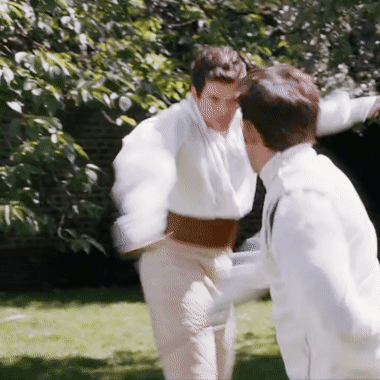
Then, in walks one of Penelope's suitors (preferably the douchey-est option or Fife), and Colin asks for a match (he's telling himself that he just wants to see what this guy is made of) OR the suitor asks him for a match so he can boast about being beating a Bridgerton (which Colin sees right through).
They fence, the suitor seems pretty skilled and Colin's heart isn't in it and he isn't winning. But while they're talking the suitor either disrespects Pen with some comment OR declares that he is going to propose and it sends Colin's entire world SPINNING. We see his entire demeanor change from chill Colin to what did you just say about my wife best friend to Colin 'I AM GOING TO END YOU' Bridgerton.
Colin proceeds to then DESTROY HIM and his pride (Colin in S2 was not the best fencer but I would love for him to pull a 'didn't see that coming did you?' and show off his newly acquired skills). He beats this suitor SO well in fact that the ENTIRE TON hears about it. People like to pretend that its only the women that gossip but are you telling me that Colin Bridgerton kicking another dude's ass at fencing is not something the other gentlemen are going to spread all over the ton?
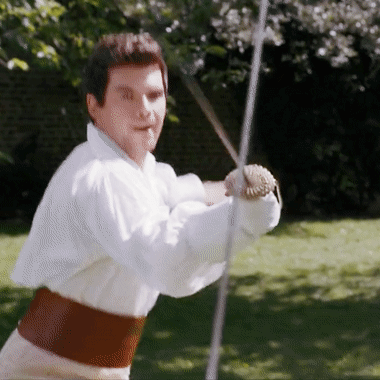
Bonus: Anthony and Benedict are also present and are absolutely stunned that their brother just humiliated another gentleman of the ton like that. They ask him about it and Colin says the suitor was being ungentlemanly and disrespecting Pen. He brushes it off and pretends like its no big deal because he was just doing his duty. Anthony and Ben share an eye roll and a very pointed look because of course this was about Pen.

The speculation in the ton is WILD with people saying Colin did it to defend Penelope so much so that even Pen hears about and has to write about it in LW (but she underplays it and when Colin reads LW he is offended LW thinks Penelope is not worth fighting over).
Even better if Pen calls him out about it because why is he going around basically dueling her suitors to defend her honour? He is not her husband and he is certainly not Lord Featherington (more foreshadowing) and Colin is just confused because our boy can't even imagine NOT defending the love of his life his bestie. It would add tension between them and force Colin to question why he reacted the way he did (love my dear Colin... IT'S LOVE).
It would work as great foreshadowing (as we know Bridgerton loves to do) for Polin - all the other suitors aren't considering Colin competition at the moment and underestimating him because of his comments last season but he's going to come out of nowhere and win over Penelope.
Do i just want to see Luke Newton fence again? YES I DO.
Am I coming up with extremely complicated ways to make it happen? YEP
Am i ashamed? NOPE

All the male leads have had a scene in the show where we see how frustrated/jealous they are (Simon boxing with Will and Anthony fencing with his brothers). The idea of Colin secretly having gotten better at fencing over the past year and destroying one of Pen's more douchey suitors would be EPIC. (I will watch this shit on repeat for years to come) And I JUST KNOW Newts will deliver with Colin's microexpressions going from calm and unbothered to pissed off to cocky and charming when he wins.
WHO DO I HAVE TO PAY TO MAKE THIS HAPPEN?😭
(since we probably won't get it I am working on writing a fic about this on AO3 --- coming soon!🥲)
249 notes
·
View notes
Text
The Mirror and the Light stream of concsciousness ramble on Wreckage....GO!
So the opening works really works for me I think the new footage is seamless and even the aging works because the tone shift is dramatic at the end of season one...the lighting the excessively bright lighting in the wedding scene and I'm wondering dear god Peter I hope you haven't taken to heart all our bitching about the brightness levels in season one??? Surely this is an aesthetic/artistic choice and then I remember that it matches the discordantly sunny scene at the end of season one when Henry embraces cromwell after Anne is killed. I love that Rafe and Crom just exchange one word "done" and Rafe wishing it weren't bloody and being a tad accusatory and I remember those scenes in the book when Anne flirted with Rafe in order to tease him ...So much of the dialog is very um not in the book but I like the ax quote it probably has a precedent. Love that we are diving straight into the plot and Call me is a different person but the same clothes and the dialog has to be too on the nose to help newcomers, which is a choice and I guess I'm fine with it because it's ep one. Still. Keep up people. The ambiguity continues when we don't actually know what the letter is though its implied its from Mary and if so in the next scene Crom fully lies to the king's face about it. Love the lightning in the tower scene with Chapuy, kinda wanted it to be a folly outside under the open sky like in the book but I guess they couldn't just conjure up a sunny day. the hilarious chapuy cromwell frenemy banter continues...OMG seeing Richard, even from behind I knew it was him and he looks more like historical Crom every minute and is probably closer to his age than mark but oh look Crom's wee knife. I love that we are getting bad ass crom and his knives and his bully boy moves with the poles and calling himself a dog (*dies) and especially the scene in the privy chamber when he practically tackles fitz...The scene with mary was letter perfect to the book but somehow missed the tone of the book which was funny but also tragic...and the mouse bones embrace was entirely great and lilith lesser is KILLING it and she'll pray for him and dear god he needs it...oh the cap thing was sexy when it should have been awkward but I forgive because when they are busted by lady shelton and she says "unhand the lord privy seal" it kills me...love crom and lady shelton they are another great pair of flirts. Oh and then the triumph of the signing and lording it over the other lords and norfolk having to eat shit was golden. Henry gets scarier/weirder in every scene and I love it. Margaret Douglas making the most of her two lines and being HBIC throughout was golden: FORESHADOWING. Jane continuing to be awkward as well as flirtatious with cromwell...also love the scene where they walked through a dark hallway and he leads her into the light of the dance...the light of Henry's love. Oh and the lovely reunion between Mary and her father only marred by the weirdness of Henry saying "you've loved and done as much for her as my kin" and then qualifying it...TACKY, but then jovial crom at the cheerless picnic with his boys where he is telling them all smiles about the white rose promise to Katharine and they all total bitches about it except Richard. I love you Richard. I don't remember Ghost!Wolsey having this many lines in the book but I can never get enough JP in a red Cardinal's gown so I don't care. Cromwell's orange jacket is amazing but I think Mark is actually having some kind of asthma attack in some scenes because he's wheezy, maybe they should build a fan into his suit. Same thing with Damien, though I think his breathlessness might be character work as Henry is getting progressively less fit as it goes on.
9 notes
·
View notes
Text
"All right; I'll go now"; and I asked the others to wait a few minutes for me, as I had to go and see my "patient."
why is patient in quotation marks
"Take me with you, friend John," said the Professor..."May I come also?" asked Lord Godalming. "Me too?" said Quincey Morris. "May I come?" said Harker. I nodded, and we all went down the passage together.
Renfield is now a fun field trip for the class
I was so much astonished, that the oddness of introducing a madman in an asylum did not strike me at the moment
I know I say this every time, but man, psychology sucked in 1893
Honestly, I would say Seward deserves everything he gets for not listening to Renfield, but Seward isn't the only one to suffer, unfortunately
"You will, I trust, Dr. Seward, do me the justice to bear in mind, later on, that I did what I could to convince you to-night."
YOU TELL HIM
I went with the party to the search with an easy mind, for I think I never saw Mina so absolutely strong and well.
foreshadowing is a narrative device
"Say, Jack, if that man wasn't attempting a bluff, he is about the sanest lunatic I ever saw. I'm not sure, but I believe that he had some serious purpose, and if he had, it was pretty rough on him not to get a chance."
Quincey continues to be the smartest man ever
but he seems so mixed up with the Count in an indexy kind of way
in a what
I only hope we have done what is best.
you haven't
He held up a little silver whistle, as he remarked:—
"That old place may be full of rats, and if so, I've got an antidote on call."
wait
do whistles deter rats?
remind me why they thought it was a good idea to go into Carfax at night, when the Count is most powerful?
Then, taking his little silver whistle from his pocket, he blew a low, shrill call. It was answered from behind Dr. Seward's house by the yelping of dogs, and after about a minute three terriers came dashing round the corner of the house.
oh okay
The rats were multiplying in thousands, and we moved out.
sudden stupid thought that came into my head and won't leave: what if Dracula wasn't technically cooking the food in Transylvania? What if he and one of the rats there were doing their own version of Ratatouille?
More than all do I rejoice that this, our first—and perhaps our most difficult and dangerous—step has been accomplished without the bringing thereinto our most sweet Madam Mina or troubling her waking or sleeping thoughts with sights and sounds and smells of horror which she might never forget.
*cries* You are all so stupid.
She looks paler than usual. I hope the meeting to-night has not upset her. I am truly thankful that she is to be left out of our future work, and even of our deliberations. It is too great a strain for a woman to bear. I did not think so at first, but I know better now.
SO STUPID.
Even Mina must have felt its exhaustion, for though I slept till the sun was high, I was awake before her, and had to call two or three times before she awoke. Indeed, she was so sound asleep that for a few seconds she did not recognize me, but looked at me with a sort of blank terror, as one looks who has been waked out of a bad dream. She complained a little of being tired, and I let her rest till later in the day.
GUYS YOU HAVE READ THE ACCOUNTS OF LUCY'S ILLNESS AND/OR WITNESSED IT YOURSELF, PUT TWO AND TWO TOGETHER
"I know you well enough; you are the old fool Van Helsing. I wish you would take yourself and your idiotic brain theories somewhere else. Damn all thick-headed Dutchmen!"
God bless Renfield
I shall go, if I may, and cheer myself with a few happy words with that sweet soul Madam Mina
YOU SAW WHAT WAS WRONG WITH LUCY, SEE IT HERE
if she had remained in touch with the affair, it would in time infallibly have wrecked her.
sigh.
deepest longest sigh of all time.
If I hadn't gone to Whitby, perhaps poor dear Lucy would be with us now. She hadn't taken to visiting the churchyard till I came, and if she hadn't come there in the day-time with me she wouldn't have walked there in her sleep; and if she hadn't gone there at night and asleep, that monster couldn't have destroyed her as he did.
Mina no, don't do this to yourself
The gaslight which I had left lit for Jonathan, but turned down, came only like a tiny red spark through the fog, which had evidently grown thicker and poured into the room.
MINA. MINA. YOU HAVE READ LUCY'S MEMORANDUM, PUT IT TOGETHER
To be fair Mina has more of an excuse than anyone else, because Dracula is influencing her now
Suddenly the horror burst upon me that it was thus that Jonathan had seen those awful women growing into reality through the whirling mist in the moonlight, and in my dream I must have fainted, for all became black darkness.
even under Dracula's thrall she's still smarter than everyone else
but of course she won't tell anyone about this. OF COURSE.
I put my question quickly and somewhat sternly, on purpose to disconcert him. The effort succeeded; for an instant he unconsciously relapsed into his old servile manner, bent low before me, and actually fawned upon me
Seward why are you the way that you are
Blow spiders!
Does blow here mean what I think it means
Merciful God! the Count has been to him, and there is some new scheme of terror afoot!
YOU DON'T SAY
Count de Ville
Subtle, Drac. Real subtle.
9 notes
·
View notes
Text
love as magic :: rayla + callum’s mage arc (s4 update)
So I made a post about this over a month ago and a much longer meta about Rayla as an agent of Narrative Change in Callum’s specific arc with magic (as he has arcs with his family, grief, also running throughout Arc 1 and 2) forever ago ?? (Oct 2021 dear lord) but this is my unofficial follow up because S4 did what I’ve been hoping for for a very long time
Which is to say rather than leaving the parallels between Callum’s relationship with magic and his relationship with Rayla as purely subtextual, it finally made them 100% textual, thank you very much
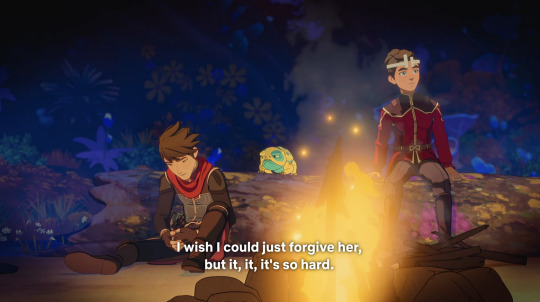

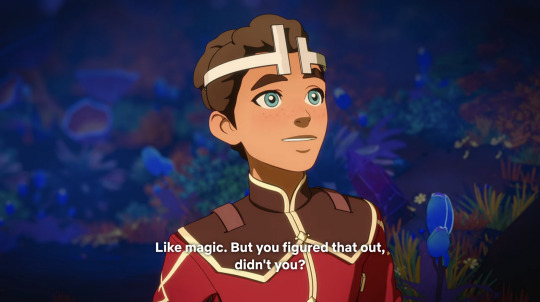
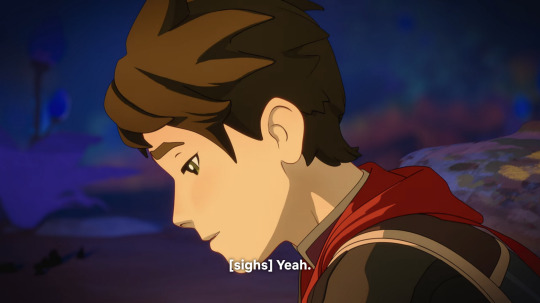
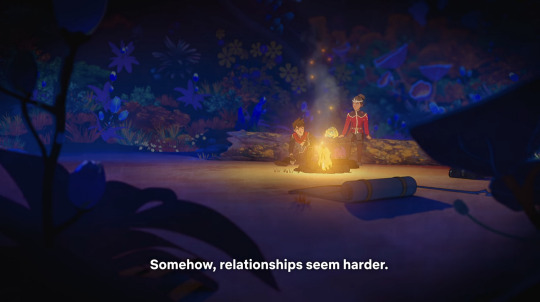
So now I just wanna scream about why this is a big deal, to me, anyway
The first is that this is not technically the first time this has happened, with three main preceding events. The one that probably counts the ‘least’ purely because it’s supplementary material (although it did help me predict that Rex Igneous was gonna eat a jelly tart like 2 years in advance so you know, can also be relevant sometimes) is from Callum’s Spellbook, in which Rayla has a note saying “Love is magic” in agreement with him (and Amaya also signs it, so future Janaya foreshadowing maybe?) as the closing note / page of the entire book.
This sentiment is of course very well reflected in the other moments that draw the largest parallels between Callum’s journey with magic and his development with Rayla. When Callum connects to the Sky arcanum, he does so propelled by love from the memory of his mother and anchored in the present by love from Rayla, with pretty clear parallels.
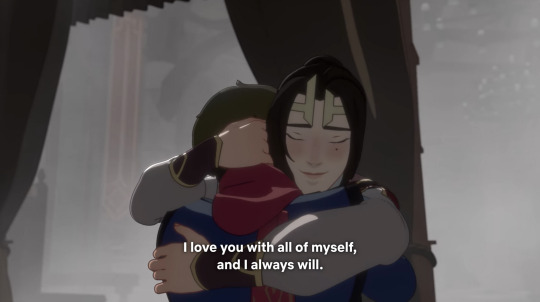
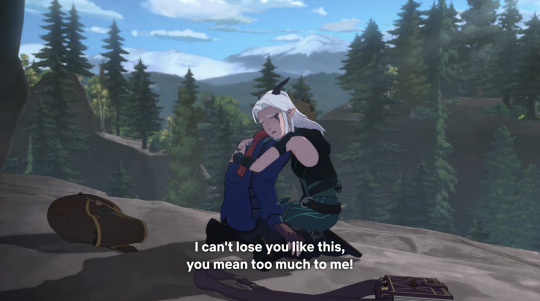
And in his eyes, it is his love for Rayla that makes the wing spell work for the first time against all odds.
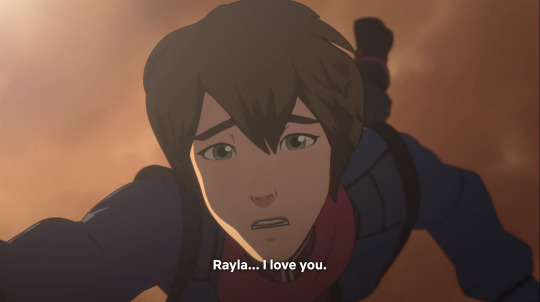
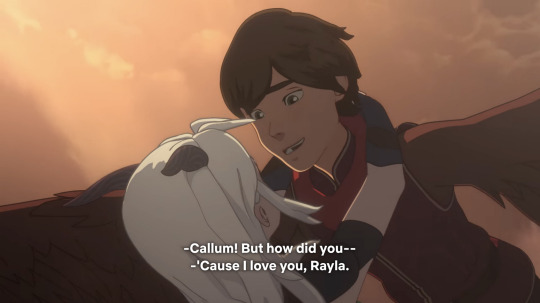
Season four continues this trend, then, with the creators confirming in multiple interviews that one of the reasons Callum became so obsessive about the mirror was to distract himself, and we see this first hand in their reunion scene as he goes to his half-empty Tome of Translation, then using the mirror as a wall, etc etc. Even throughout the season in terms of how he uses his staff as well, until he realizes he can’t use it as a crutch any longer and flat out drops it to pick up Rayla’s sword.

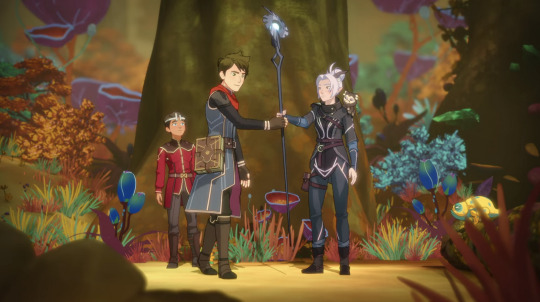

Okay cool, so Callum’s arc with magic often parallels this relationship arc with Rayla, even into S4. (If you’re interested in how it parallels in S1 and S2 I’d recommend the metas linked at the top.) Why does this matter?
Well, it lends itself very well to the idea that while reconnecting with Rayla, Callum will also connect to the Moon arcanum in a future season (likely season five) and possibly while breaking free of Aaravos’ brainwashing.

It also helps to balance out the negative side effects he’s experiencing due to magic use with some of the more positive ones, like the emphasis of agency in Callum’s arc or the fact it can help him protect his loved ones, like the rest of the Dragang.
TLDR; I think it’s a great example of how relational TDP is with its story arcs (i.e. Soren’s position as crownguard is about his own construction of self and also his relationship with Ezran, reaffirming each other in a loop) as well as how the show displays that the best things or characteristics in our lives can also routinely be our worst ones if taken too far to extremes, and I just think it’s a neat fun consistency and reflects how Rayllum’s dynamic changes every season, while Ezran has thus far routinely been there to anchor Callum as a foundational > transformative aspect.
#rayllum#mage boy#tdp#the dragon prince#tdp meta#arc 1#arc 2#s4#parallels#analysis#analysis series#moon arcanum theory#i am so sorry the last paragraph is one sentence but we're leaving it as is bc this was impromptu ok bye#s4 continually taking the undercurrents of the first three seasons and bringing it the forefront#my beloved <3#s4 is my best friend#wishlist achieved
65 notes
·
View notes
Text
Dorothy, Volume 1 (2005) Scans - Chapters 3 & 4 + Bonus Covers // Part 3 of 3
Here is Part 3 of my Dorothy comic post!
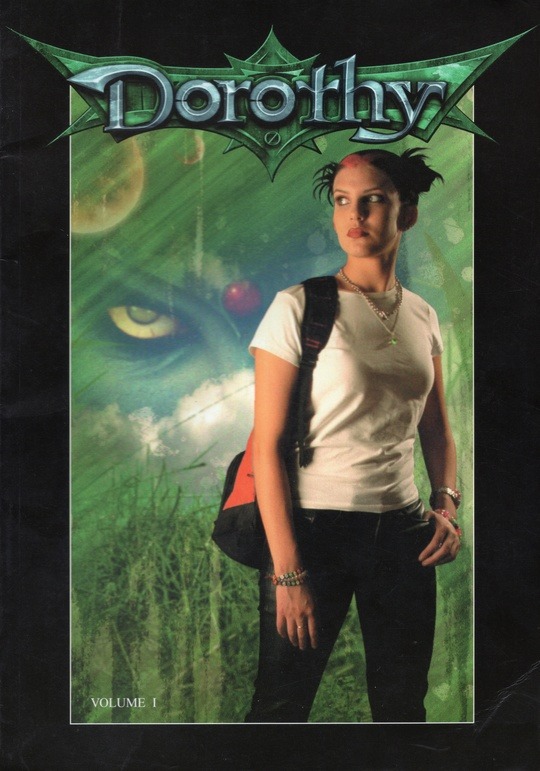
Please refer to Part 1 for some background info about this book and its old website, and Part 2 for scans/story overview of Chapters 1 & 2!
In this post (Part 3), I'll cover Chapters 3 & 4 of the comic, completing the Volume 1 book.
Chapter 3 begins with Dorothy and To-2 aimlessly wandering around, unsure of which way they are supposed to go to get to the munchkin village. They stumble across the scarecrow shown at the end of Chapter 2.
Dorothy and the Scarecrow banter back and forth for a bit.
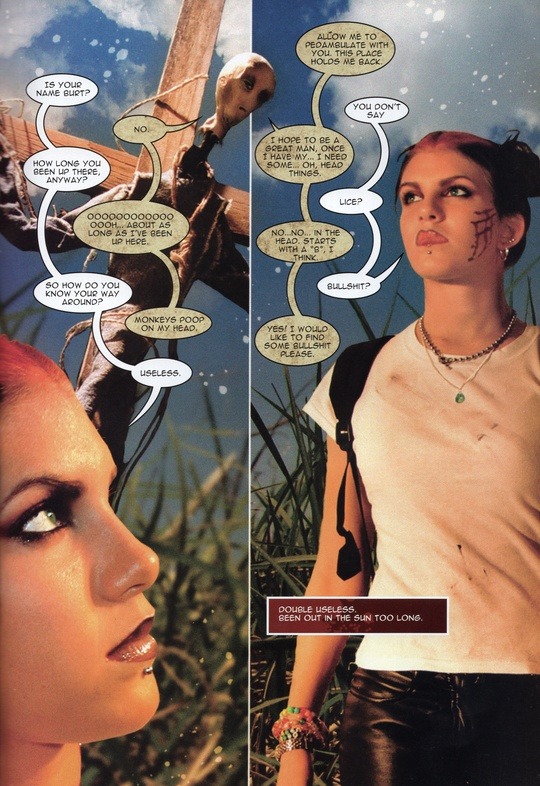
He's so creepy looking! But he is harmless. According to Dorothy, useless even.
Dorothy begins walking away, and she has quite a funny thought as she's leaving.
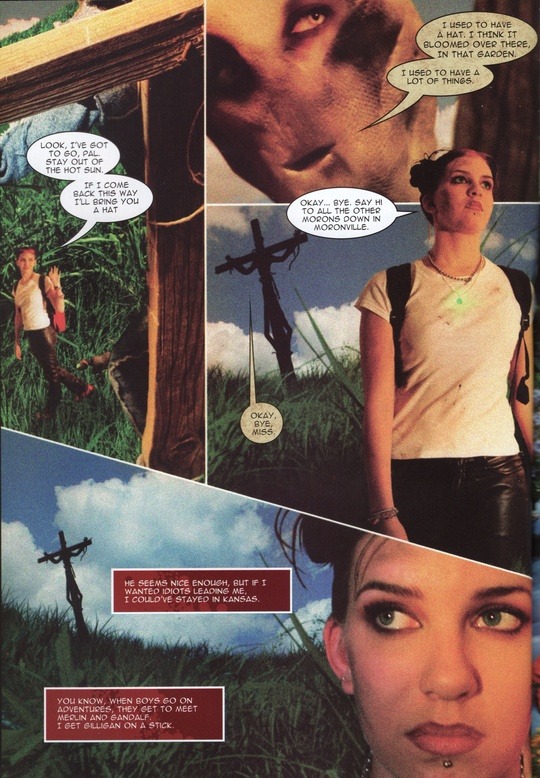
Dorothy and To-2 keep walking on, and stop at a beautiful blue river to drink and rest. Dorothy is so hungry that she contemplates eating a bug that looks like a ladybug with spider legs.
She takes a breather to collect herself, and realizes there is a cave located behind a waterfall. Dorothy and To-2 walk underneath the waterfall into a cave, video game style.
Exhausted, they curl up on the cave floor for a nap. Dorothy dreams of being a kid, and of Aunt Em giving her a little stuffed doll that used to belong to her father. Aunt Em calls the doll a Scarecrow, and says the doll can scare the bad dreams away. Dorothy muses on how the doll is nothing more than scraps at the bottom of her backpack now.
Dorothy awakes to a giant snake, who claims that she was sent to him as a sign, as prey for him to eat.

Dorothy tries to offer the snake the wrapper of a long gone Baby Ruth bar from her backpack.
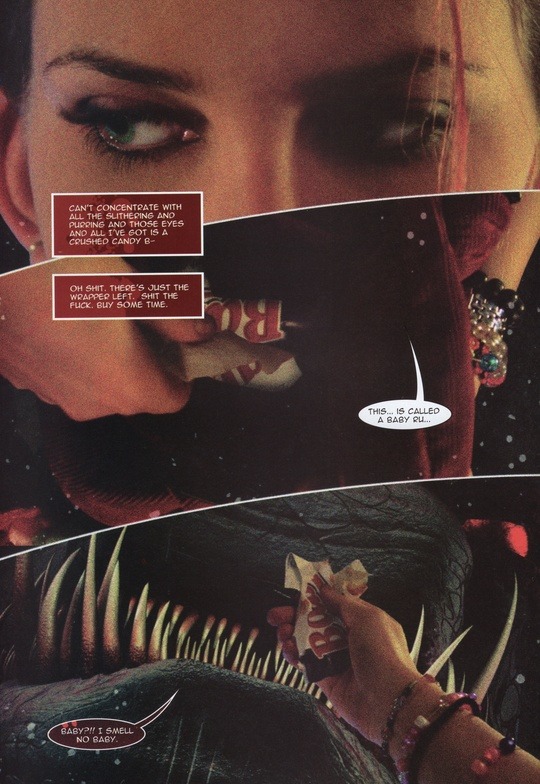
Remember when I said there was foreshadowing earlier?
Well, when the snake isn't impressed with the empty candy wrapper, Dorothy remembers one thing she does have available to defend herself.
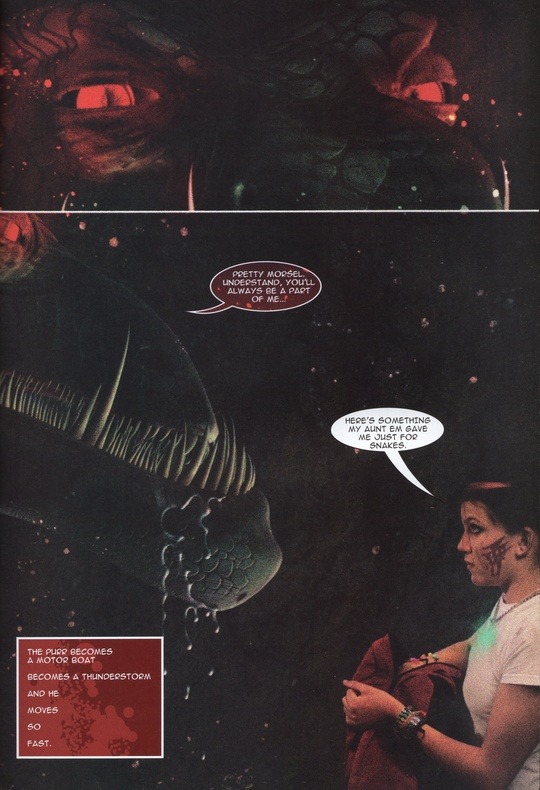
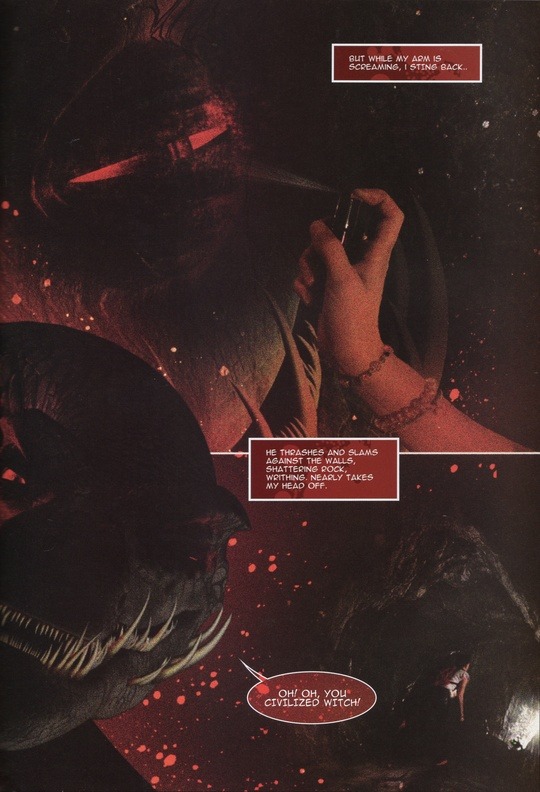
Dorothy manages to incapacitate the snake, and her and To-2 run out of the cave to safety. Unfortunately, Dorothy did get bit during this altercation, and the wound looks quite nasty.
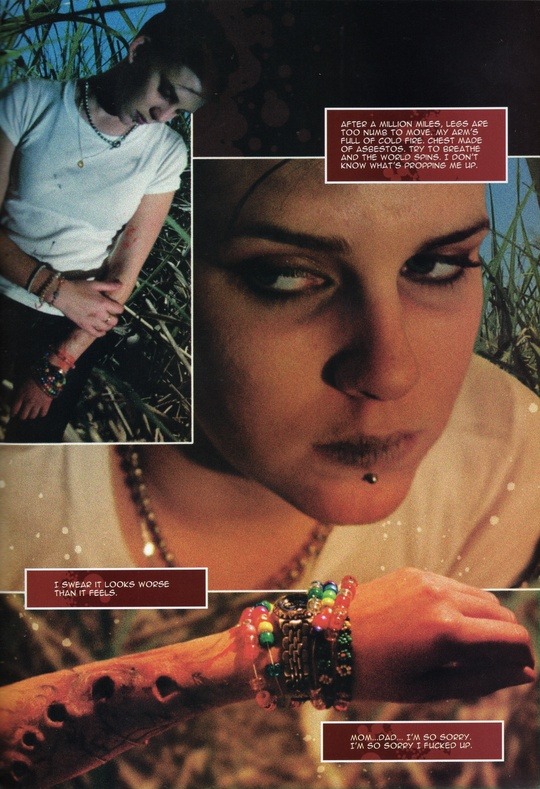
Homegirl ain't looking so hot.
Good little To-2 helps lead Dorothy back to the Scarecrow, where she asks for him to accompany her.
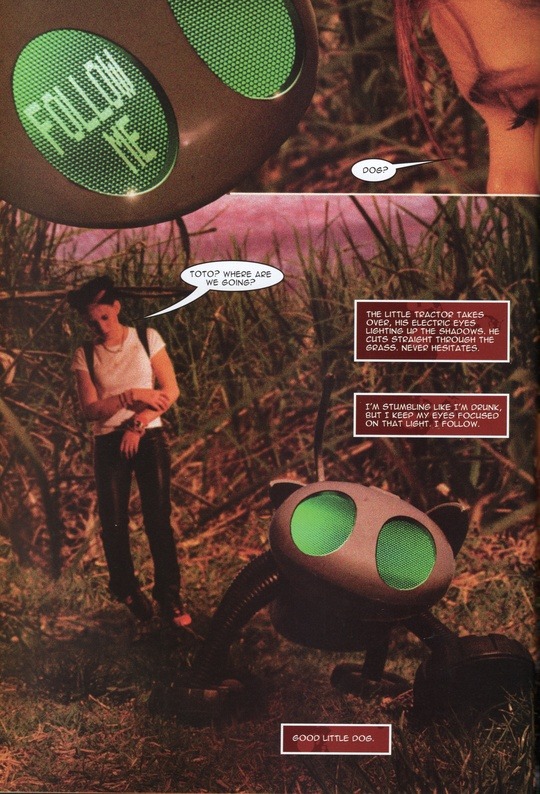
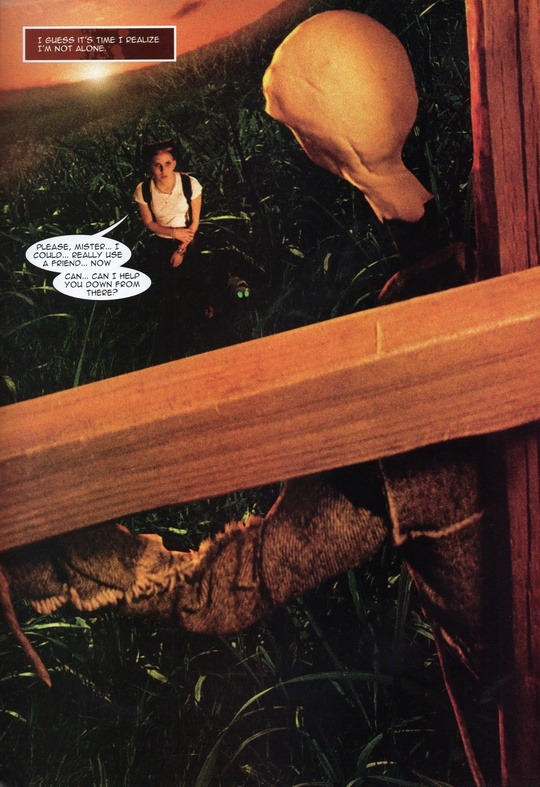
It's quite sad and sweet really, considering we now know her comfort toy was a stuffed plush meant to be a scarecrow.
。°。°。°。°。°。°。°。°。°。°。°。°。°。°。°。°。°。°。°。°
Instead of starting with Chapter 4, there is a small interlude chapter that opens up with a man writing a letter. Essentially he states that he knows this is his last day in Oz, and that the one most dear to him is away and safe. He concludes with "Despite those who seek to choke that spirit, Oz never dies".
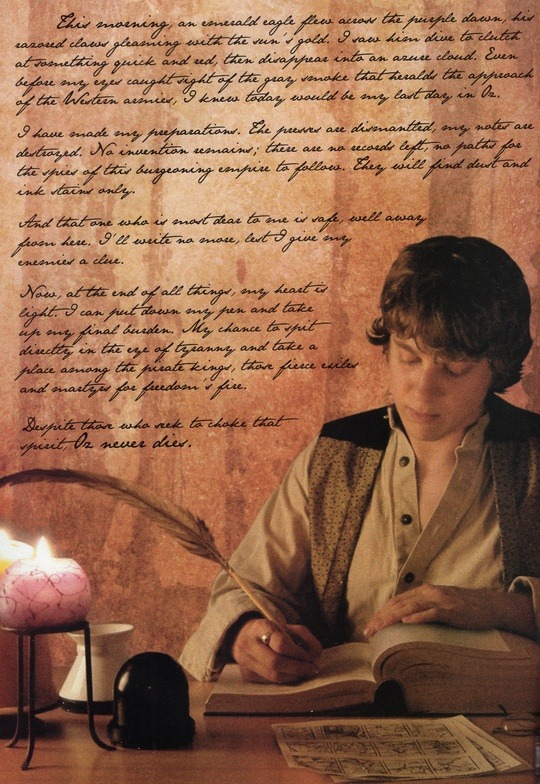
The man is then taken away by robots, but saved by...some guy who just wandered in?
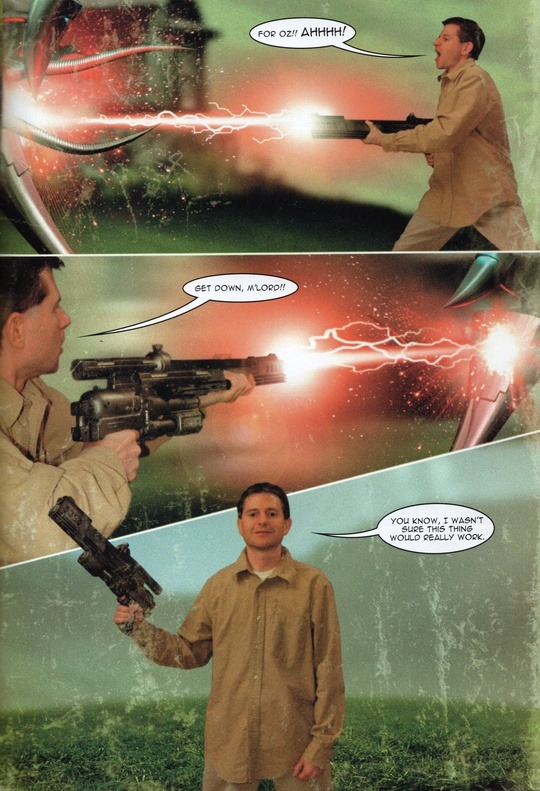
This page is actually so funny to me.
The laser gun? His outfit? Him basically saying "Get down, Mr. President!!" His pose and expression in the bottom panel?
Either way, we learn that letter guy is a Lord of some sort. The Lord of Oz, perhaps?
We also learn our laser gun man is Malo, and that he was supposed to be with her, who we can only assume is the Lord's dearest person he hid away.

Oh no.
Oh god.
I've only just met you, and now you are gone.
Goodnight, sweet Prince. My favorite character, brought into my life and taken away from me in the span of a couple pages.
So yeah, Malo is killed by the robots, and the Lord is knocked unconscious by the robot army.
We then go back to Dorothy and company to start Chapter 4.
。°。°。°。°。°。°。°。°。°。°。°。°。°。°。°。°。°。°。°。°
Chapter 4 starts with Scarecrow on the ground. I'm assuming the Scarecrow is meant to be the Lord from the interlude, who we saw get knocked out and fall to the ground.
Dorothy is not looking good for wear, after her injury from the snake monster. Her and Scarecrow talk as they're on their way to the munchkin kingdom. We get a LOT of exposition about the war and the Wicked Witch and all that jazz, which honestly...I don't care too much about. So I'm skipping it LOL.
The crew make a fire and stop trekking for the night, and Dorothy wakes up feeling worse. Here is a page depicting how long and gangly Scarecrow looks.

Actually terrifying. Would never want to be approached by THAT in a dark alley.
However, he is harmless, and seems to care about Dorothy's dwindling health.
We cut back into the exposition story. Scarecrow had been describing a man as "the Fool", who is meant to be the Lord that was kidnapped by the robots.
He is brought before the Evil Queen. They go back and forth, and she sentences him to "the hallowing".
Which is not a good thing.
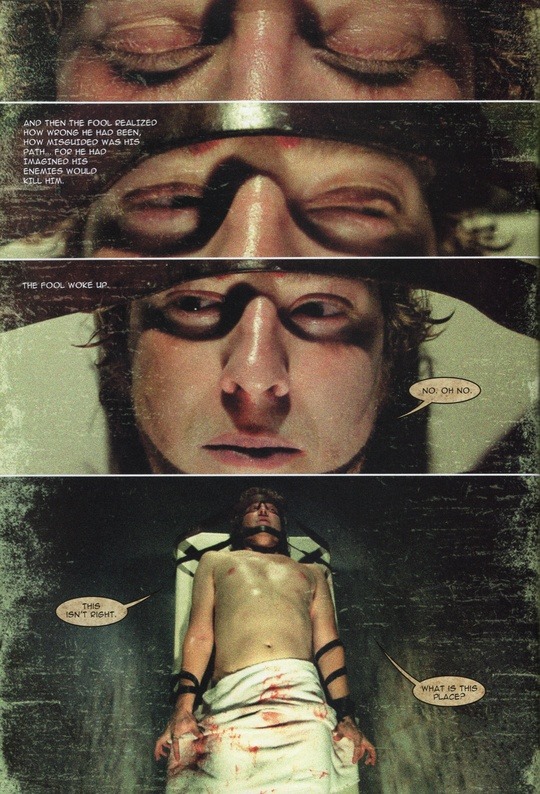
As the text says, he believed he would have been killed, and is surprised to find himself still alive. Weirdly enough, the man recognizes where he is, and pleads for his life with his interrogator.
He ends up tortured and beheaded. Don't worry, I won't show those panels, they're actually quite graphic.
While he is recounting this story, Scarecrow begins to see flashes of the man's life, and begins questioning himself.
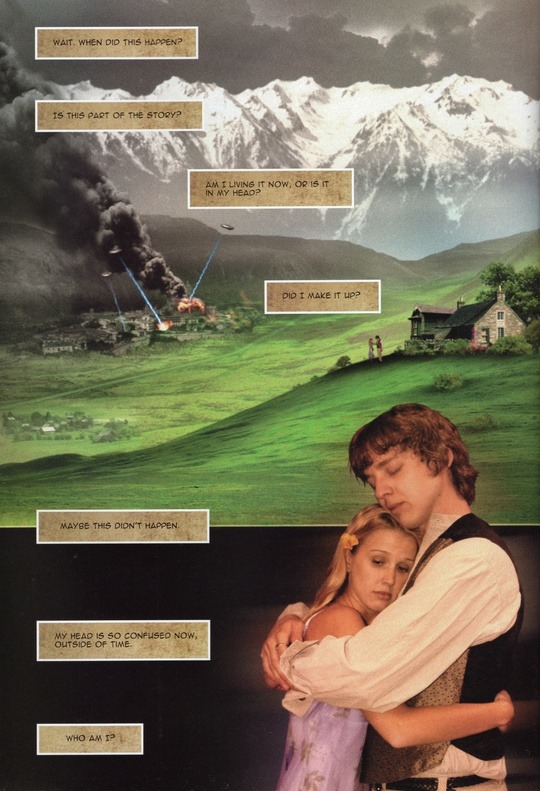
Scarecrow recalls being shown the head of the man by his "maker" (the interrogator/torturer), and is told that he (the Scarecrow) will be a symbol used to put fear into the people and scare away the rebellion.
Scarecrow tells Dorothy that he was brought out to the field and strung up for this reason. At this time, Dorothy begins falling against Scarecrow, unable to keep walking.
Scarecrow thinks back on this some more, and remembers a woman being brought into the dungeon he was in before being taken out to the field.
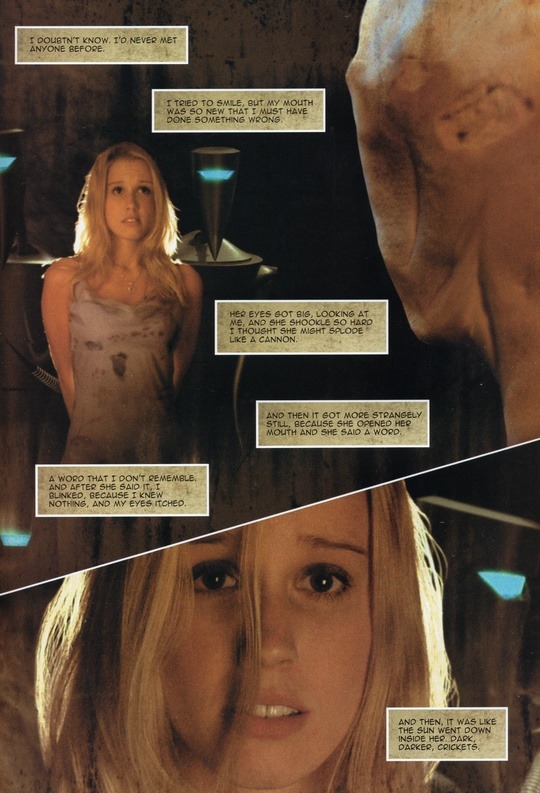
He doesn't recognize her, but she seems to recognize him. She is the woman shown in the flashback panel and is the "dearest person" mentioned earlier.
She is then killed in front of Scarecrow, and he puts it as them "making her go away". Dorothy is practically unconscious at this point, and Scarecrow picks her up in the present time and says that he doesn't think he likes it when people "go away".
Dorothy weakly looks up at Scarecrow and muses how he reminds her of the stuffed doll her father had. Here are the final two pages.
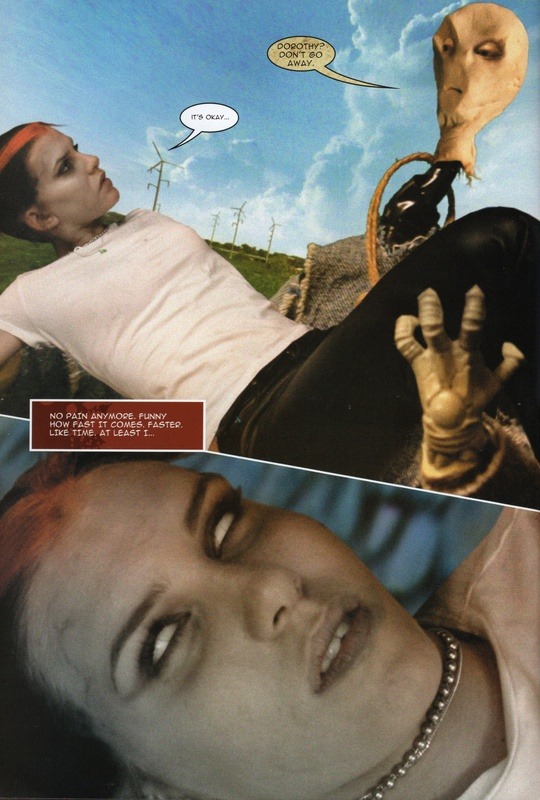
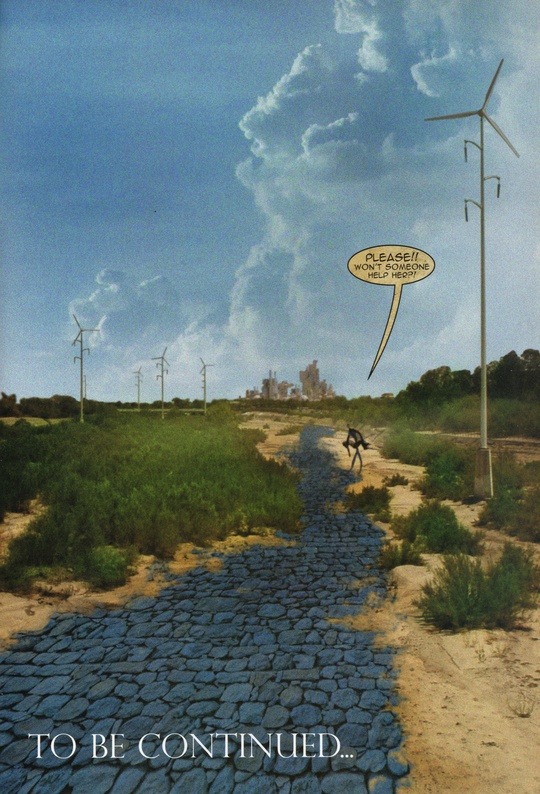
Gasp, cliffhanger!
Poor Scarecrow and Dorothy.
At least the munchkin kingdom is in sight? I don't have the remaining three comics, but I imagine it picks up with them going there.
Sadly enough, even if I did have the remaining comics, the series abruptly ends on a cliffhanger and is never resolved.
。°。°。°。°。°。°。°。°。°。°。°。°。°。°。°。°。°。°。°。°
And that's it for Dorothy, Volume 1!
It's been pretty cool visiting the first four chapters of this old, abandoned comic.
After the fourth chapter, the book includes copies of all the comic covers.
Here they are!
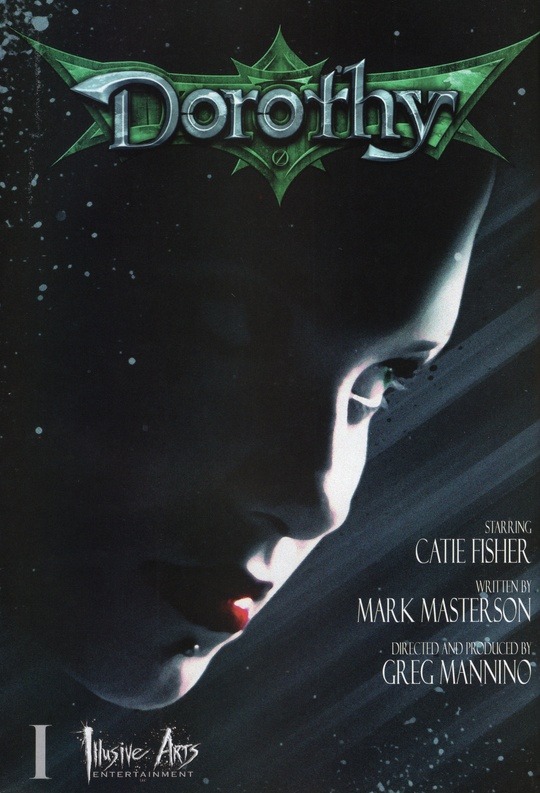
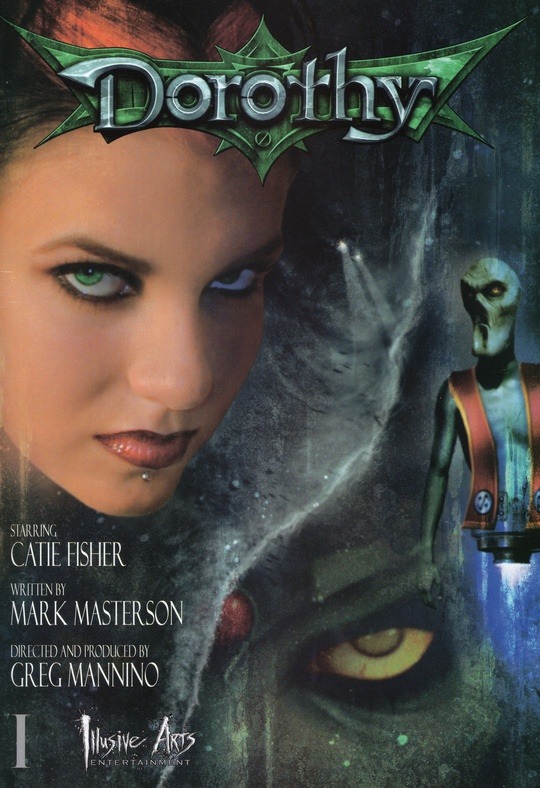
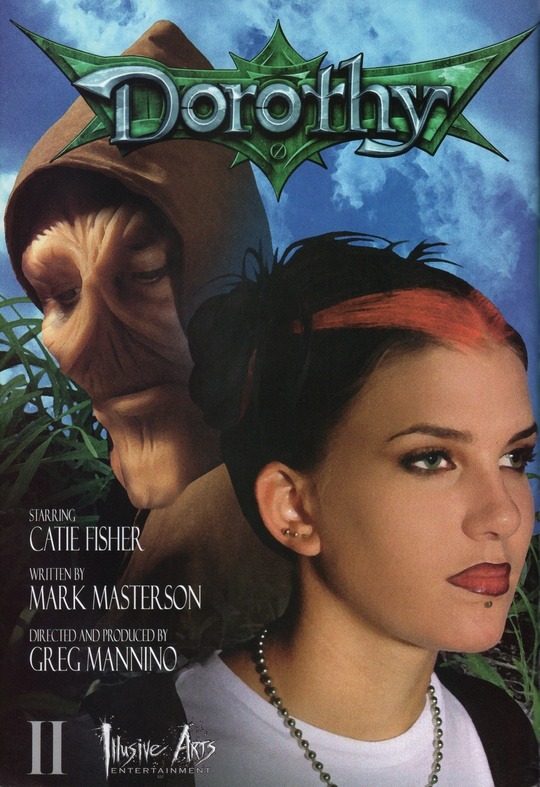

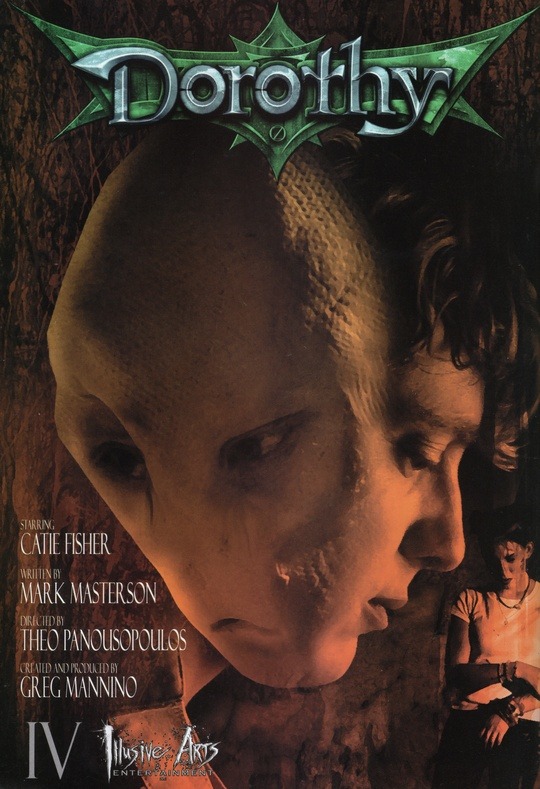
Love love love that these were included.
There are also a couple of what appear to be teaser comic covers/promotional pages for the upcoming chapters.

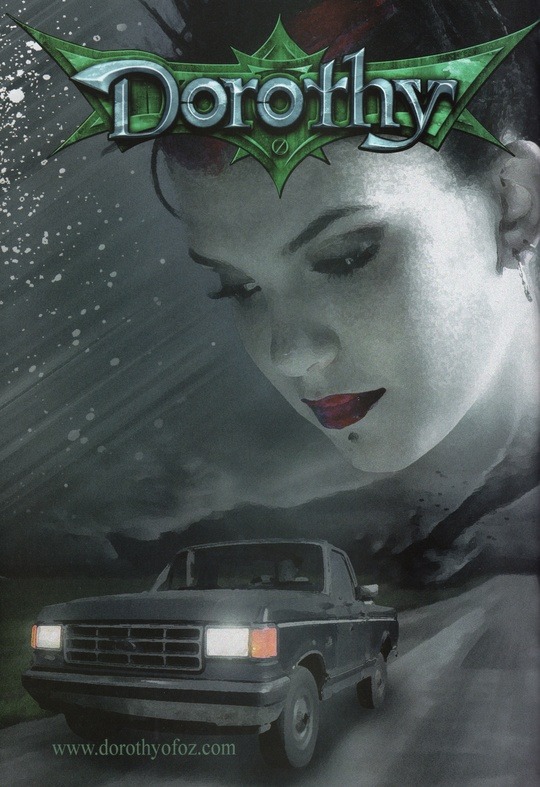
Very cool!
As much as I personally am not that interested in The Wizard of Oz or retellings of it, I do appreciate the vision and work that went into creating this comic. The photographic acting against a digital backdrop is such a unique concept, I haven't seen anything like it before.
All in all, I think this was an awesome thrift find!
。°。°。°。°。°。°。°。°。°。°。°。°。°。°。°。°。°。°。°。°
As always, you can read the whole book and see higher quality scans on my Internet Archive account.
Thanks for stopping by!
Part 1 -> Intro & Background Part 2 -> Chapters 1 & 2 Part 3 -> You're Here!
#txt#dorothy#dorothy comic#dorothy volume 1#dorothy gale#comic#comics#comic book#2004#wizard of oz#scans#part 3#long post#books#catie fisher#greg mannino#mark masterson
3 notes
·
View notes
Text
RHAPSODY OF REALITIES DAILY DEVOTIONAL
Wednesday, 15th February 2023
BUILD ACCORDING TO HIS DESCRIPTION
Moses was warned when he was about to build the tabernacle: “See to it that you make everything according to the pattern shown you on the mountain (Hebrews 8:5 NIV).
PASTOR CHRIS OYAKHILOME PHD
When God told Moses to build a tabernacle, He gave him a clear description and instructed him to build according to the description: “According to all that I shew thee, after the pattern of the tabernacle, and the pattern of all the instruments thereof, even so shall ye make it” (Exodus 25:9).
In your walk with the Lord and work in His Kingdom, don’t just run off with every idea just because you think it’s nice. Be sure that you’re following God’s blueprint; the pattern and description that He’s given. It’s one of the reasons you must know the Word for yourself.
In His Word, you find samples, patterns and descriptions of how He wants us to live, the things He wants us to do and how to do them. The psalmist said in Psalm 127:1, “Except the LORD build the house, they labour in vain that build it…”; we must build according to His plan.
In these last days, the Lord Jesus is building His Church. He said, “…I will build my church; and the gates of hell shall not prevail against it” (Matthew 16:18). There’s a description given to us in the Word of God that shows how He’s doing this. The Bible says He (Christ Himself), “…gave the apostles, the prophets, the evangelists, the pastors and teachers, to equip his people for works of service, so that the body of Christ may be built up” (Ephesians 4:11-12 NIV).
His plan is to build through these leaders, but everyone is involved; each one of us contributes to the building of this great body of Christ: “From whom the whole body fitly joined together and compacted by that which every joint supplieth, according to the effectual working in the measure of every part, maketh increase of the body unto the edifying of itself in love” (Ephesians 4:16).
Every time you lead someone to Christ, you’re adding to the building of the Body of Christ, and it's a magnificent building. Hallelujah! Keep playing your role by winning souls into the Kingdom. You’ll be contributing to the building of the magnificent structure according to the description given.
PRAYER
Dear Father, I thank you for the ability of your Word in my spirit. I’m a doer of the Word, not just a hearer. The results of living in and by the Word are evidently manifested in every area of my life today, in Jesus’ Name. Amen.
FURTHER STUDY:
Hebrews 8:5 AMPC [But these offer] service [merely] as a pattern and as a foreshadowing of [what has its true existence and reality in] the heavenly sanctuary. For when Moses was about to erect the tabernacle, he was warned by God, saying, See to it that you make it all [exactly] according to the copy (the model) which was shown to you on the mountain.
1 Samuel 15:22 And Samuel said, Hath the Lord as great delight in burnt offerings and sacrifices, as in obeying the voice of the Lord? Behold, to obey is better than sacrifice, and to hearken than the fat of rams.
3 notes
·
View notes
Note
I wonder if the "war arc ending" thing used allways to be the case in shonen. From Naruto to MHA to OP in the future and even partly Soul Eater with the whole clone army thing - guess its a logical conclusion of ever growing stakes and powerlevels, spectacles that need to leap over all what came before.
Naruto may not have needed to be a war--but then again, you have villages in territorial disputes, inspired by the history of ninjas used in warfare, so it's kind of hard to avoid that as a plot trope.
Same with One Piece: it's a pirate story, it has a navy, it has a world government, it's kind of hard not to bring up war.
MHA is divisive for me. Superhero stories don't strictly have to be war stories. And I'd too sour to treat the ongoing war arc(s) well, as I can't believe how badly the Pro Heroes dropped the ball on all of this (not preparing enough, not enough heroes, not having more contingency plans, somehow just letting Re-Destro or, rather, his clone, show up at their offices and not having a plan to contain him before he killed someone).
Superheroes have been in war stories (they have been used repeatedly to drum up support for war efforts). But that's not quite how MHA went about it...
...Although, given the post-January 6 2021 climate we're in in the US, I end up looking at the war arcs and realizing, "Ah, okay, this is what happens when you have some really evil fuckers doing fucked up shit to government officials--and a government too incompetent or so destroyed from internal rightwing forces that it can't respond in time, got it."
To its credit, maybe Fire Force ending without a war exactly, or saving the final moments for mostly talking it out and re-directing any action scenes not to a fight but the action film equivalent of painting a blank landscape was more creative....and that is about the nicest thing I can say about Fire Force compared to all the other series I just mentioned above.
I don't get why Soul Eater ended with a war arc. I can accept that Ohkubo had in mind a fight against Asura and Crona planned far in advance, to have them be the titular soul eater.
But Asura had since faded away for so long. Who cares that we now have him confronted finally?
And even when considering that Justin and the Clowns had been popping up for awhile, what actually were they accomplishing? What was Asura's goal here? Did he just want to be left alone? Was he planning to bathe the world in madness to get back at dear old dad? That arc felt like it needed more build-up: showing an actual set of steps Justin and the Clowns were following would have helped, having Asura appear in one other arc and actually doing something in that arc to hamper the DWMA would help, foreshadowing earlier that Asura had something in common with Death and Kid would have helped.
Otherwise, the war arc to me felt like an action figure fight: "Here's my Maka Albarn action figure, here's my Crona action figure, I'm going to knock them into each other for a fight before I just have them kiss and make up."
I'm not ignoring what good these war arcs can do. Bakugo finally apologizes to Izuku. We see Black Star come into his own. We say goodbye to Lord Death. All of that works. But nothing about those strike me as needing a war to make them happen.
And that's not even getting into when your war story is more like a GI Joe story rather than a response to actual real-life wars, assuming a silly fantasy story is going to handle such a response well. (See the odd Iraq invasion reference by Kid in that one chapter.)
If you're going to do the war to raise the stakes, fine, that can work. As I said, the stakes going up so that Bakugo is finally forced to apologize and Black Star gets to vomit up a laser--that all is fine. I guess what I want is a war arc emerging out of the characters' arcs and their interpersonal relationships. Is Toga's internalized trauma exploding out in a sea of Twice really needed for a war arc? Does that work at giving closure to how she regards Twice, the League, Ochaco, and Izuku? I don't think so, it seems unfocused with so much other stuff going on. Endeavor versus Dabi? Sure, that seems more suitable. Whatever is going to happen in a fight between Izuku, Shigaraki, All Might, and All For One? I guess that is inevitable.
But these are individual battles, not what I consider to be part of a larger war. Wars, I tend to think, are long-lasting affairs, small battles, insurgencies, isolated instances that foment more discord, weaken one side, lead to more desperate measures. You want an actual war arc? Watch DS9. I don't see it happening with the examples mentioned earlier, not in a more strict definition of "war."
About the only time I think the looser definition of a "war" worked was in something like Teenage Mutant Ninja Turtles 2003, Season 5--where it's just, "Hey, we need to grab every last single character, hero or villain, we have ever met in this series, to work together for a final attack on the Shredder--because if he wins, all of us, hero or villain, are dead." The stakes are that large that we call that a "war," even when it's just one final attack, not a long set of battles. Sure, it's fanservice--but it was a hell of a good amount of earned fanservice.
Or, maybe war arcs suck. If you're going for spectacle, just go for a tournament as your finale, like the Cell Games in DBZ or in Yuyu Hakusho.
2 notes
·
View notes
Text
Worthy Brief - October 4, 2024
The Lord Himself provided!
Genesis 22:7-13 And Isaac spoke to Abraham his father, and said, My father: and he said, Here am I, my son. Then he said, Behold the fire and the wood: but where is the lamb for a burnt offering? And Abraham said, My son, God will provide Himself a lamb for a burnt offering: so they went both of them together. And they came to the place which God had told him of; and Abraham built an altar there, and placed the wood in order, and he bound Isaac his son, and laid him on the altar upon the wood. And Abraham stretched out his hand, and took the knife to slay his son. And the angel of the LORD called unto him out of heaven, and said, Abraham, Abraham: and he said, Here am I. And He said, Lay not thine hand upon the lad, neither do thou any thing unto him: for now I know that you fear God, since you have not withheld your son, your only son, from Me. Then Abraham lifted up his eyes, and looked, and there behind him was a ram caught in a thicket by its horns. So Abraham went and took the ram, and offered it up for a burnt offering instead of his son.
One of the major themes of Yom Teruah (Feast of Trumpets) is called Akedat Yitzchak, which means the Binding of Isaac. According to Jewish tradition, God told Abraham that the ram's horn – otherwise known as a shofar – should be blown on Feast of Trumpets to remind people of the sacrifice that God provided Himself when Abraham was about to offer Isaac on Mount Moriah. It's abundantly clear that this event in the life of Abraham and Isaac foreshadowed God the Father's offering of His Son, providing Yeshua (Jesus) as a sacrifice for all men.
As we now are in the midst of the "Days of Awe" – traditionally, a time of repentance between Yom Teruah and Yom Kippur – let us take the time to examine ourselves, turning from sin again, toward our loving Creator, as we celebrate the fact that our names are written in the Lamb’s book of life. Through His perfect sacrifice, the Lamb of God, Yeshua, God's forgiveness is eternal and His love, everlasting.
Shabbat Shalom and have a great weekend!
Your family in the Lord with much agape love,
George, Baht Rivka, Obadiah and Elianna (Baltimore, Maryland)
Editor's Note: New Videos Published, https://www.youtube.com/watch?v=osRo7Pegpk4&feature=youtu.beand "Yom Teurah (Feast of Trumpets), Wars, https://www.youtube.com/watch?v=tKOCLK624cA&feature=youtu.be
Editor's Note: Feel free to share any of our content from Worthy, including Devotions, News articles, and more, on your social platforms. You have full permission to copy and repost anything we produce.
Editor's Note: During this war, we have been live blogging throughout the day -- sometimes minute by minute on our Telegram channel. https://t.me/worthywatch/ Be sure to check it out!
Editor's Note: Dear friends — we are now booking in the following states. Alabama, Tennessee, North Carolina, South Carolina, Georgia, and Florida! If you know Rabbis, Pastors or Leaders who might be interested in powerful Israeli style Hebrew/English worship and a refreshing word from Worthy News about what’s going on in the land, please let us know how to connect with them and we will do our best to get you on our schedule! You can send an email to george [ @ ] worthyministries.com for more information.
0 notes
Text
Dear Peter,
Early Christians routinely explored how Old Testament “types” foreshadowed New Testament persons and events, revealing how Christ fulfilled Scripture.
In Acts 7:44, Stephen uses the word pattern to refer to types, as does Hebrews 8:5. Paul also uses the word shadow or copies to refer to, for example, the Old Testament Sabbath and festivals foreshadowing the Lord’s Day and New Testament feasts. Similarly, Hebrews describes the Old Testament Law, high priesthood, sacrifices, the Temple, the Sanctuary, etc. as copies or shadows of Christ and of other New Testament realities.
Types are real, historical persons, institutions, places, things, or events that prophetically prefigure and find fulfillment in Christ, or in real, historical New Testament counterparts. The fulfillment of a type is the antitype, which is always greater than the type. Parallel facts or similarities link the two, transferring the type’s meaning to the antitype. It is God—Scripture’s true author—who gives the type-antitype link its foundation in his intended meaning of the Scripture passage.
Some types are positive: Jonah’s three days in the fish prefigures our Lord’s three days in the tomb; the Great Flood, Noah’s Ark, and circumcision prefigure Christian baptism. In such types we see a positive link and parallel between the type and its fulfillment.
Yet the type-antitype link may also be negative and antithetical. Adam is an antithetical type of Christ (Rom. 5:12-21, 1 Cor. 15:20-50), since Christ fulfills the type by his exact opposite effect: Adam condemns all men by his disobedience; Christ saves all men by his obedience.
To read a type or prophecy properly, we must identify the true subject and event being prophesied or foreshadowed, which is often quite hidden. For example, Jeremiah 31:15 prophesies, “Thus says the Lord: ‘A voice is heard in Ramah, lamentation and bitter weeping. Rachel is weeping for her children; she refuses to be comforted for her children, because they are not.’”
Who is Rachel? What event is this foretelling?
The prophecy’s Old Testament context points us to the exile of Israel. But Matthew points us to Herod’s attempt to destroy the Messiah by killing the innocent children in Bethlehem (Matt. 2:13-18). This means that prophecies and types—especially those involving the Messiah—can have multiple fulfillments, one that is immediate and others that come later. Thus, Rachel prefigures the people of Israel, the town of Bethlehem, and the Virgin Mary.
Marian types are identified in relation to those prefiguring Jesus. A well-developed type for Jesus is Adam. The name Adam is Hebrew for man (Gen. 1:26-27; 3:17), making him—prior to eating the forbidden fruit—the father and archetype for all men. Christ replaces Adam as man’s archetype. As in this archetype, whenever Scripture compliments, praises, or blesses any human being, it implies that Jesus is even more blessed and worthy of praise.
Eve’s name is also important. Originally, Adam named her Woman (Gen. 2:23), Ishshah in Hebrew, revealing that she was the archetype for woman prior to the Fall. She is renamed Eve (Gen. 3:20), losing her archetype role.
Jesus renames his mother Woman as woman’s new archetype. This first occurs at the wedding feast of Cana (John 2:1-12), on the seventh day of the new creation. Mary draws Jesus’ attention to the lack of wine, and Jesus says to her, “Woman, what is this to me and to you, my hour has not yet come?” (John 2:4, literal translation).
This phraseology seems a bit awkward and impersonal, both in English and in Greek; to Roberts it “seems curious, even disrespectful, though he does the miracle. However, if we replace Woman with a proper name, it reads better: “O Eve, what is this to me and to you?” As Woman, gyne in Greek, Mary is “an instigator of Jesus’ first miracle at Cana in Galilee, launching Jesus’ public ministry.
Giving Mary a new name (Isa. 62:2; Rev. 2:17, 3:12) is especially significant because it is connected to our Lord’s hour of suffering, as disciple and mother. Timothy George considers Mary’s response truly Christian:
Mary’s second exemplary saying comes at the wedding at Cana. First Jesus has this little, almost, tussle with his mother, saying, “Woman, my hour has not yet come”—which sounds a little bit gruff, Jesus speaking to his mama like that. But then she says to the wine stewards, “Whatever he says unto you, do it.” Well, again, this is the call to, as Evangelical Protestants sing, “trust and obey.”
Jesus again identifies his mother as Woman while on the cross as he looks upon the apostle John and his mother: “Woman, behold, your son!” (John 19:26). Again, we resolve the awkwardness of this phrase by substituting Woman with a proper name, making it read better: “Mary, behold, your son!” Mary is Woman because our Lord’s hour is also her hour of travail.
Woman stands at the cross without uttering a word. She stands. She watches. She fulfills Jesus’ command: watch and pray (Matt. 24:42, 26:41, etc.). She listens to Jesus, and she receives his beloved disciple, given her as a son.
We hope you enjoyed this question-and-answer excerpt from Fr. John Waiss's brand-new book Bible Mary: The Mother of Jesus in the Word of God
0 notes
Text
TerraMythos 2022 Reading Challenge - Book 12 of 26
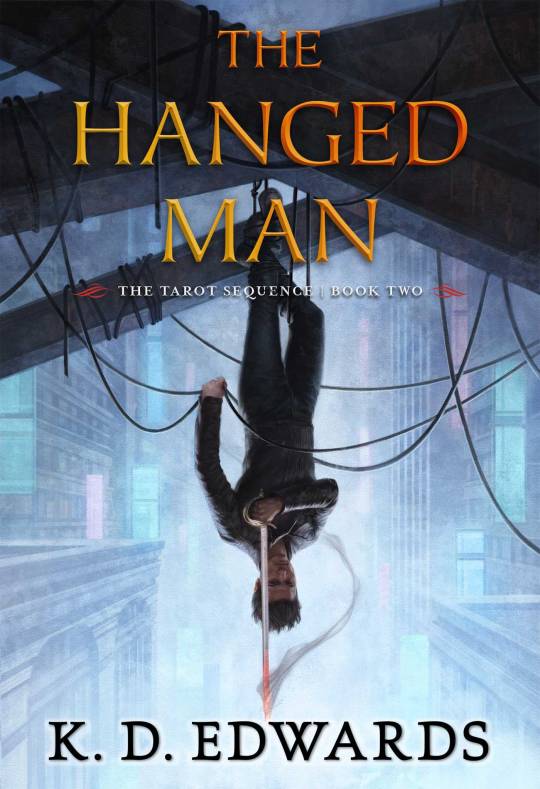
Title: The Hanged Man (The Tarot Sequence #2) (2020) ***RE-READ***
Author: K. D. Edwards
Genre/Tags: Fantasy, Urban Fantasy, First-Person, Unreliable Narrator, LGBT Protagonist
Rating: 10/10
Date Began: 06/05/2022
Date Finished: 06/26/2022
Rune Saint John's teenage ward Max has a troubled past. Things come to a head when the sadistic Lord Hanged Man tries to kidnap him due to an old marriage contract. Lacking the resources of a true court, Rune cannot go after the other Arcana directly. In order to protect Max from a terrible fate, Rune investigates the disappearance of Layne, another teenager targeted by the Hanged Man. But Rune soon discovers just how deranged the other Arcana is-- as well as a secret that could throw New Atlantis back into war with the human world.
He was surrounded by no great houses. His rule on his court was absolute and unchallenged. He was a monster to monsters, even in a city like New Atlantis.
But I’d survived monsters before.
Review, content warnings, and some book/series spoilers below the cut.
Content warnings: Depicted-- PTSD, violence, death, mass death, gore, body horror, suicide, mind control, drug addiction, self-harm, animal abuse, human trafficking/slavery, stalking Mentioned—Warfare, child death, r*pe, torture, dehumanization, abuse, child abuse, sexual abuse, p*dophilia, grooming, past traumatic injury, recreational drug use, child marriage, forced marriage, cannibalism, mild suicidal ideation
Dear lord is this review late. I finished the book, started a new job, then had surgery, then promptly had my life consumed by Nirvana Initiative for a while. So this review might suck a little bit! Oh well!
The Hanged Man was an enjoyable rer-ead. I stand by my earlier statement that The Tarot Sequence as a whole vastly improves from this book onward. As fun as The Last Sun was to re-read after the revelations in book three (and as… unexpectedly packed with hints and foreshadowing as that book is), it certainly has its weak points. My most prominent complaints about the first book, like its repetitive pacing and complete lack of women, are for the most part addressed in this second entry. There’s a focus on murder-mystery and subterfuge over the generic action of the first book, which I think strengthens the story considerably. We also get several intriguing female characters in this story, such as Corinne, Anna, and Lady Death.
One trend I like in both The Hanged Man and The Hourglass Throne is their heavier lean into horror elements. The Last Sun has an undead thing going for it, but it’s generic fantasy action stuff. But in The Hanged Man we have the creepy ghost ship infused with time magic to torment the victims of a slaughter. There’s a lot of emphasis on the main three exploring the ship and uncovering all the horrible shit the titular antagonist did to these people. I think Edwards does a great job making the whole thing feel genuinely haunted. Lord Hanged Man himself is also particularly eerie and horrible. I hope The Tarot Sequence sticks close to horror as a secondary genre, because I think it’s a great addition to otherwise standard urban fantasy.
I remember being shocked on a first read that Rune claims his throne so early in the series. It definitely feels like an endgame thing, or at least a “conclusion to the first trilogy” thing. While still a surprising development, the lead-up into it is pretty entertaining once you know what’s coming. Ciaran continues to be the funniest character in the damn series. There’s just… so many lines/reactions/etc hinting at his true identity. He’s definitely grown into my favorite supporting character. I love that he presents himself a self-interested prick while genuinely helping and caring about other people—a trait that’s quite relevant in The Hourglass Throne.
Much of my general series praise, to no one’s surprise, stays the same. I love the dynamic between Rune and Brand, and the additional context from book three makes certain lines and situations hit different on a re-read. Particularly all the times Brand gets mind controlled for one reason or another, and how Rune responds to that. Addam gets a lot of development this book and shapes into a more likable character (like, he’s not BAD in the previous book, but I didn’t feel much about him compared to the other two). There’s also a heavier focus on the main three and their dynamic together. This pays off BIG TIME in The Hourglass Throne. Though that being said, I would like to see more one-on-one interaction between Brand and Addam. I’d… be pretty surprised if that doesn’t happen, considering the book three development.
Beyond the main three there’s a lot of new characters introduced in this entry. Lady Death is probably my favorite of the Arcana, and I’m glad she plays a prominent role in this and the next book. It seems like she’s being set up to be a sister figure and/or BFF for Rune. I’m totally down for that, she’s really fucking cool. The Dawncreeks are central to the series going forward, particularly Anna, who becomes Rune’s heir. What the fuck is up with Anna? Who fucking knows! I sure don’t! Someone tell me!
Foreshadowing is a little less blatant than in The Last Sun, but it’s still definitely present. There’s lots of little lines and character reactions that just hit different on a re-read. My favorites are the “landmine” lines put in to SPECIFICALLY fuck with people re-reading the series. Always a treat and an excellent source of psychic damage. Re-reading is DEFINITELY a handy tool after The Hourglass Throne, particularly regarding the, uh, new dynamic between the main three. Doing so has resolved a lot of the ambiguity, often in ways that make me go insane and text my sister for three hours straight.
There’s still a lot of hanging mysteries I’ve got no clue about. Why is Anna so scary powerful? What the fuck was that bit that switched to present tense? Come to think of it what’s with all the DIFFERENT bits that switch to present tense? How was Lord Tower able to talk to Brand through the Companion bond? There’s also the Mystery Woman who saves Rune in The Last Sun (and makes a guest appearance in The Hourglass Throne). While I don’t know her motivations, I have a working theory about her identity that I’m 95% sure is correct based on my re-read. Incidentally, this ALSO made me go insane and text my sister for three hours straight.
In all I genuinely don’t have many criticisms about this series. It’s not perfect, but a re-read has made me appreciate it more. I love the characters, the worldbuilding, and the many layers of mystery surrounding the series. My main beef is that we’ll probably have to wait a few years for the next one at the rate they’re coming out. Alas.
10 notes
·
View notes
Text
Lost and Wins in Adaptation
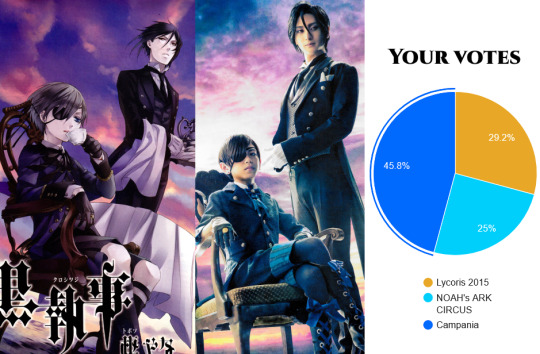
Dear everyone, as per Anon’s request, I shall analyse a Kuromyu and discuss the Lost and Wins in Adaptation. The results of your democratic votes (comments and asks) are out, and the winner is TANGO ON THE CAMPANIA! In this post I shall only be discussing character/plot influential changes, so no stand-alone comedic sketches will be included.
This is going to be a very long post because there’s just so much to unpack. But feel free to read it in bits, or skip to the part you are most interested in (but do come back later though (ÒvÓ)b). This post will include the following sections:
What makes a good adaptation?
AberHanks - Expert Glue and Filler
“Just like my family!” - One line, many messages
Grell - A Capable Career Woman
An unfortunate Sacrifice
Raw Trash Demon
Active Inclusion Midfords - Manga Fix?
Reunion and Aftermath
Afterword
I promise you the analysis will make you love TotC even more!

1. What makes a good adaptation?
2.5D wouldn’t exist without the 2D, so it is essential for any 2.5D producer to prove to the fans the producing side understood the source material using their form of medium. Changes are inevitable, but the key is that when things are changed, the core of the original needs to remain intact.
Theatre as medium’s biggest disadvantage is its strict time constraints. Whether the producers are capable of adapting a story within the time constraints without it feeling like a quickly duct-taped patchwork is what distinguishes a good adaptation from a bad one. The scriptwriters have no choice but to sacrifice parts to tell a concise story, but the art is in skillfully choosing what to yeet. The musical does need to be able to stand on its own without new audiences going “what?”, after all
2. AberHanks - Expert Glue and Filler
The most obvious difference between the original manga and Tango on the Campania is the addition of Aberline and the musical original, Hanks. In Tango on the Campania they are very cleverly employed to tie the musical together within the time constraints.

Ronald appeared before the Campania Arc, but it wasn’t before this one that he gets his own proper introduction. What the manga readers and musical-only audience have in common then, is that at this point of the story, Ronald is almost equally new. The line: “if we get to meet again, alive, that is” is a very effective way to introduce Ronald’s chipper but cynical personality. In the manga Ronald’s conversation partner was a passenger who fancied Ronald. It would have been a waste of stage time to adapt the third class setting and introduce this girl too, but skipping the line entirely would not do Ronald’s introduction justice. So the script writers cleverly used AberHanks instead, and when Ronald delivered the iconic line, the impact is still the same as in the original.

Additionally, AberHanks are supportive roles in them being police officers who help combat the zombies. The historic Titanic had a really poor survival rate, and that’s without dealing with murderous zombies. In Campania however, that’s a different story. I would argue that Aberline and Hanks evacuation efforts, along with the Formidable Midfords greatly increased the survival rate of Campania passengers.
This addition is a brilliant three-birds-one-stone move. This firstly shows that despite AberHanks being the comic relief, as the police they are not there to fool around. Secondly, by explicitly placing the Midfords along literal fighters of crime, the audience also clearly understands what the Midfords - the Chivalric order - are: fellow fighters of crime.
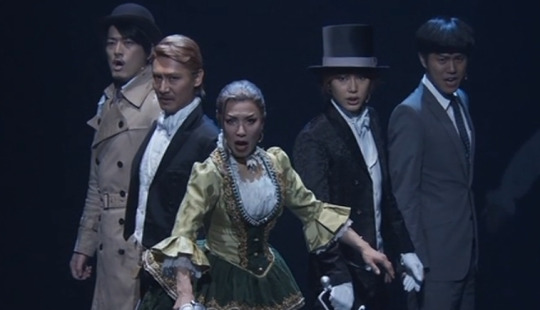
Thirdly, the gentleman’s code of evacuation is children and women first, and AberHanks would undoubtedly also have heeded that code. And yet Frances was there, and AberHanks never attempted to evacuate her or doubted her skill. The police and Frances fighting side by side shows the audience that even in the 19th century, Frances is recognised firstly as member of the Chivalric Order, before being ““just a woman in a huge dress””. Don’t mess with her.
3. “Just like my family!” - one line, many messages.
A very small but game-changing alternation is when Ciel was trying to convince Lizzie to remove her dress to benefit escape. In the manga when Lizzie refused, O!Ciel immediately rips the dress, saying that once dead she won’t be able to wear any dress, because death is the end of everything.
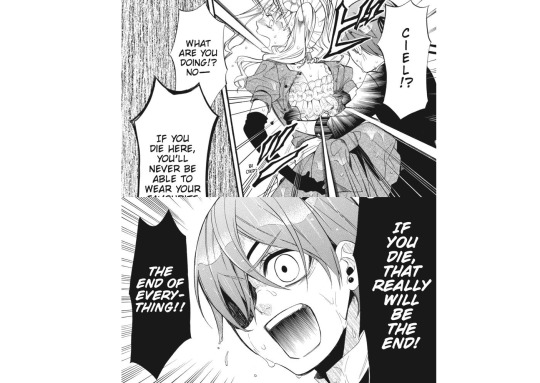
In the musical with real child actors they couldn’t very well reenact this scene, so instead they gave Ciel the line: “Everything is over if you’re dead, just like my family!”
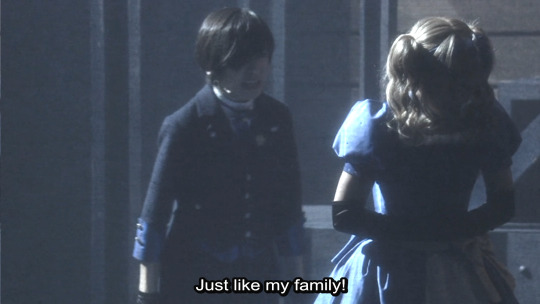
In the musical, Ciel doesn’t touch Lizzie, which is very clever. When someone refuses to remove her clothes, it is because she feels infringed, exposed and/or unsafe. If somebody doesn’t do something out of fear, what you need to do to convince them is to minimise that fear. By forcefully ripping her clothes, MangaCiel only made Lizzie feel even more infringed.
Instead of touching Lizzie, MusicalCiel appeals to Lizzie’s empathy. By making Ciel say “my family” to Lizzie, both audience and Lizzie are shown/reminded how Ciel had tragically lost his family, and cannot afford to lose more. At that time of the musical, new audiences wouldn't know yet what Ciel had been through. So when later the Cinematic Record of Sebas started, “just like my family” also functions as an effective foreshadowing of what would later be revealed, avoiding Ciel being in a cage looking like it came from nowhere to new audiences.
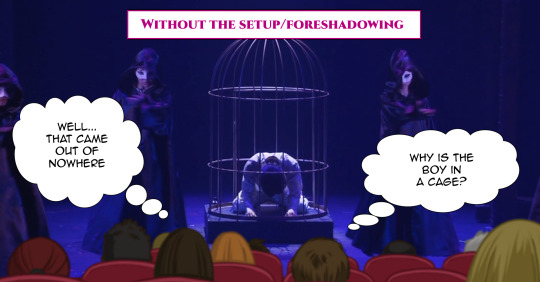
One could argue that Ciel’s phrase was emotional manipulation, yes... but it was a literal life or death situation for the objective good of everyone. And besides, we all know who our Trash Lord™ is; manipulation is part of him.
Ciel had yelled at Lizzie, and immediately he turned around, clutching his chest. It was such an impressive moment because it showed how that blow Ciel dealt was a doubled edged one. Lizzie was clearly hit too, and very quickly she realised her own fault and apologised. Then the most fun part for the audience is to consider whether this was Ciel’s genuine reaction, or whether that was all part of his acting skills in manipulating Lizzie. I say both are equally likely! (Oh Reo, you brilliant little...)

I personally consider this alteration superiour to the manga original.
4. Grell - A Capable Career Woman
Per Yana’s direct request to Grell’s actor, Uehara, she asked him to portray Grell as a capable career woman because Yana admitted she failed to do so herself.
Most of Yana’s request was fulfilled simply by Uehara’s acting and respect for Grell, but there is also one tiny line added to her script which emphasises her focus on her job. “I’m dropping you!”

Nobody on the Campania had time to fool around because it was literally going down. Grell had her job to do, and yet Rian thought it a good idea to withhold information from Grell about the method of stopping the zombies. By threatening Rian whose life was at Grell’s mercy with “I’m dropping you”, the audience is very effectively shown that Grell is a no-nonsense woman, and that she knows how to get someone to talk. 👌👌👌
5. An Unfortunate Sacrifice
Some things had to be omitted to fit the stage time limit, but the most painful omission in my opinion were details in Sebastian’s cinematic record.
A really unfortunate but understandable omission was Ciel reuniting with Tanaka and Madam Red... but considering the time constraints of the musical, shoe-horning these moments in with different actors would have come at the expense of the rest of the musical. Though very sad, it is what it is.

Another omission is Sebas forgetting to spare one assassin to interrogate. In this post I discussed in detail why this omission by the movie adaptation was such a sin. Tango on the Campania omitted that part too, though as a stage medium it is more forgivable than an animated movie with endless possibilities Ò^Ó. Nevertheless it is a bit sad, because this omission takes away that the audience can see how Sebas was just so used to massacring on auto pilot, and how even Sebas himself recognises he needs to learn control.

THOUGH, I must say the musical actually tries to compensate for this shortcoming, unlike the movie. This omission of what showed that Sebas was far from perfect at the beginning, Furukawa compensated by simply being the most insincere, passive-aggressive, unprofessional, arrogant prick he could be.
The audience won’t catch a hint that Sebas used to be no more than a weapon, but they will see how Sebastyun never served a human on close proximity before!
6. Raw Trash Demon
I have already talked about how Sebastyun is a real game-changer on this blog, so I will not repeat every detail again. So here I will only address the significant changes in spoken lines that add to Sebastian’s character before he was fully trained. In this post I discussed in detail how Furukawa portrayed Sebastian’s gradual growth from raw demon to one hell of a butler. Sebas at the beginning was really butler in appearance only, as he was insolent and never knew when to shut his wondrous trap.

In stage format it would have been quite awkward to do a bath scene, so instead the creators replaced it with a wound-dressing scene. Instead of pouring hot water over the boy, Sebastyun is now scrubbing his master’s skin off. When the boy protests, rather than immediately apologising like his manga counterpart did, Sebastyun just shoves the feedback right back down the boy’s throat. “You’re making too much of a big deal out of it.” Here we see how Sebas is not there to serve his master, he’s just doing his thing because he has to.

Another line that is musical only is when Ciel’s stomach rumbled, and Sebas laughed his arse off, saying: “what an inglorious sound!” In the manga Sebas started a high-horse speech about human weakness, which was quite bold already. But he did not seem to dare straight up humiliate his master for a basic bodily need.
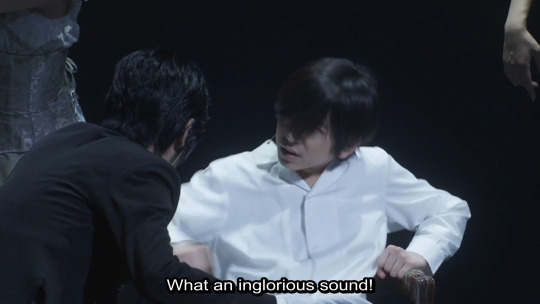
Sebastyun however? Balls of steel.
He humiliates his master, can’t apologise for shit, and when he says things in compliance with his master, it’s in a tone of: “well, screw you too”. Sebastyun was so bad at his job that Ciel too was given another line that wasn’t in the manga: “The preparations of a day’s meals is part of a butler’s job”.

Sebas had just criticised his master for being a useless kid, and now Ciel makes a comeback with the line: “well, you don’t even know what your literal job is, let alone how to do it.” The addition of this line is very powerful in my opinion, because it quite effectively compensates for the omitted scenes of Ciel and Sebas both sucking at their respective roles.

When O!Ciel commented on Sebas’ awful cooking, MangaSebas seemed quite willing to do his job well, and immediately offered to fix his mistake. Sebas does not apologise, but he does show that he made a mistake in not being considerate enough of Ciel’s current condition.

Sebastyun however, couldn’t apologise for shit at the beginning. Instead of showing openness to feedback, he immediately externalises by making humans the problem again, rather than his own lack of cooking skill. No wonder Ciel smashed that table with such aggression!
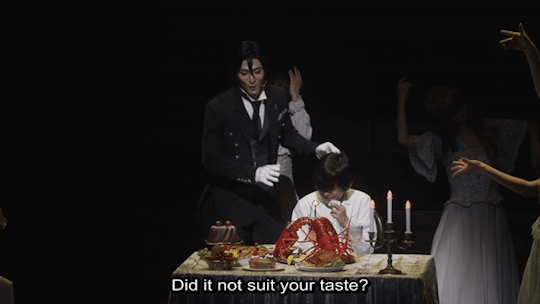
Another changed line is Sebas bringing his master hot milk after his failed dinner attempt. Originally Sebas did so potentially as an attempt to show his readiness to do better at his job. He explains that he does so out of consideration for the well-being of the boy.
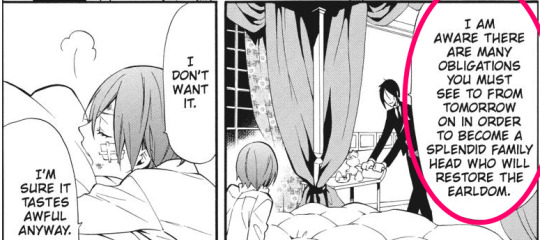
In the musical however, Sebastyun does not say the manga line. Instead he says: “I can’t afford to have you starve to death.” I am not sure whether this was the script or Furukawa’s improvisation, but either way it perfectly shows yet again, how Sebas is not there to serve his master, but to just get his tasks over with.
This is a very short but efficient alternative way to retell how Sebas especially at the beginning was not very enthusiastic about being summoned, as analysed here from the original Japanese manga. Sebas is not like: “(UwU) gimme more orders”, he’s like: “(ಠ_ಠ) what is it this time?”

A small addition that was definitely an improvisation was Sebastyun sitting down on Ciel’s bed, and the boy pushing him away. (At the beginning of the run Furukawa didn’t do that yet. The first time Furukawa sat down Reo just moved aside and gave Sebas a nasty look.) Here it also reemphasises how little Sebastian understood of what was done and NOT done as a servant.
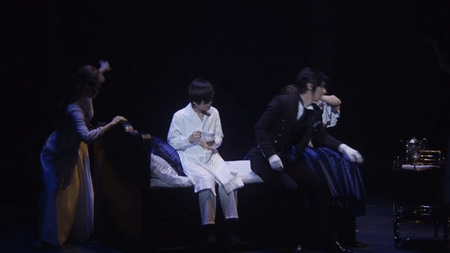
A final, noteworthy addition in the far beginning of their contract was Ciel saying that he acknowledges both he himself are the demon are still fakes. The boy says this line after Sebas had brought him hot milk which Ciel appreciated.

Ciel calls his butler forward in a soft tone, and Sebastyun just looked so self-congratulatory, self-satisfied, he adjusted his suit, standing all ready like: PRAISE ME! (●´ิ∀´ิ●)✨

Yeah no... you wish.
In the manga this line doesn’t exist, so Sebas is simply surprised to hear the compliment, and then his master just splashes the cold water right over him.
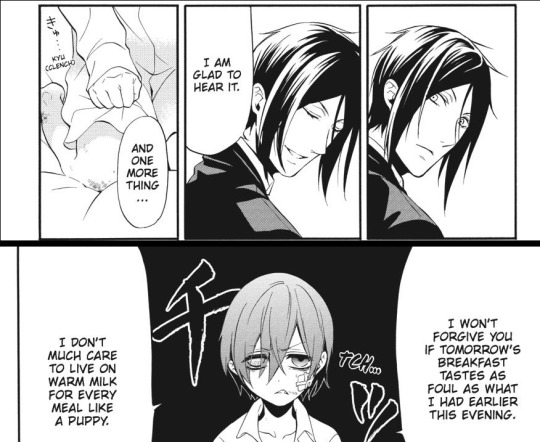
7. Active Inclusion Midfords - Manga Fix?
The most dramatic and influential change to the musical is the active inclusion of the Midfords. It is an entire scene that was added to the musical, so it is a bit impossible to unpack everything in this already very long post. So here I will only address the most game-changing alterations.
Yana Beaten to the Punch, strike 2 and 3?
Now many chapters later than the Campania Arc, we know that the Midfords had been the legal guardians of Ciel after the death of his family. But even before the release of the chapter, we’d see in Sebastyun’s Cinematic Record how the Midfords were very involved with their nephew. This shows how much respect for the manga the musical producers had, and how well they understood their source material that they too could beat Yana to the punch. Strike 2!
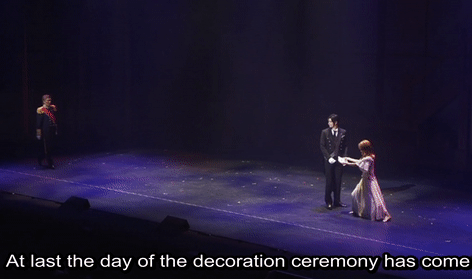
Both Midfords were present before and during the decoration ceremony. And Sebas bows deeply, thanking them sincerely for their aid all this time. Sebas cannot lie, so when he says “sincere gratitude”, it really was sincere. Alexis responds humbly, saying that it’s simply the right thing to do.

Not only did the Midfords aid Ciel in his reintegration into the world, Frances also showed the audience and Sebas she knows exactly what she is preparing the child for. Frances says she understands how cruel it is for the young Ciel to do what is expected of him, because being Earl means more than wealth and power. It is: “shouldering the burden and name of ‘the Queen’s Watchdog’.” The musical also does a great job at linking Frances’ position as the previous Watchdog’s sister, to being the legal guardian of the future Watchpuppy.

I have seen many manga readers talk about how they found Frances’ involvement insufficient in the manga, and I understand. She has a very small role in the manga, so we don’t know what she has or hasn’t done to help. But in Tango on the Campania, we do get a much clearer sense of the Midfords’ role in Ciel’s life.
Ciel was still mid-preparation before the start of the Ceremony, but Frances and Alexis had already arrived to keep a parental eye on him.Ciel is surprised, but Frances responds with: “it would set a bad example if the star is late”. Though it is but one short phrase, the script writers shows (not ‘tells’) how she is there because she wants to make sure Ciel’s decoration will go smoothly, as well as that her own role is to set an example for Ciel by being on time herself.
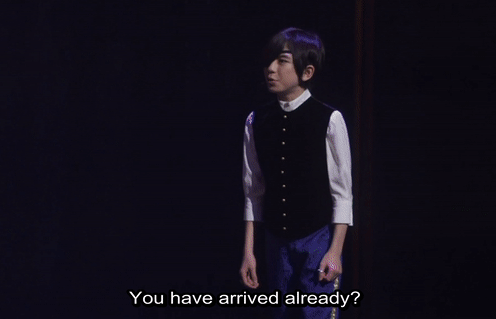
This is possibly a reference to what Sebas says to Frances in chapter 14, how he wishes her to be his master’s example. Except that here in the musical, it is Frances who takes this initiative, which in my opinion is the superiour way.
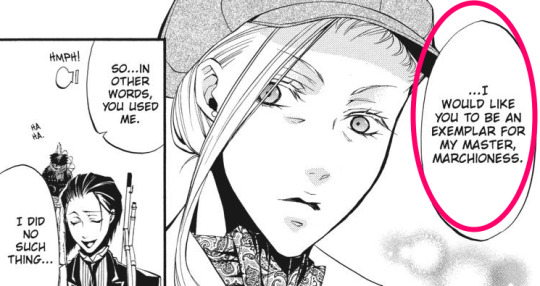
When Frances commends Ciel for his courage of returning to fight, Sebastian adds: “The most opportune chance for counter attack is when the opponent strikes. That is what milady Frances had taught him, the Young Master said.”
To which Frances is quite surprised to hear, and incredulously she says: “Ciel said that?” This makes one suspect whether Frances really said those words to supposedly Real Ciel. It would be very funny if Sebastian (accidentally) gave Frances a hint of his master’s real identity. I am not sure whether this is an implicit hint that Frances might have started suspecting Ciel is not the Real Ciel. Some have theorised Frances has the deepest suspicions among everyone. If that turns out to be true, then TotC might have beaten the original manga to the punch again. Potential strike three!

Another change is the replacement of Madam Red with Alexis. This one is just a very pragmatic change, because the phrase “To Ciel you are already as good as family” is very iconic and important and shouldn’t be left out. But getting a Madam Red in here out of nowhere would require time-consuming exposition. So by giving this phrase to Alexis instead, the musical effectively solves two problems in one go.

8. Reunion and Aftermath
Another addition to the original manga is the reunion on the rescue ship, just like the the movie adaptation of the Campania Arc did. After all that has happened it is very nice for the audience to see the emotional reunion and the aftermath. In the manga the Arc ended with Sebas and his master on the rescue boat, and it had a very nice, open feeling to it, I absolutely love it! 💖🚤
Audience Considerate Story Telling
To a musical-only audience (which TotC had a lot of because of the collaboration with TOHO), the opening ending might have felt a bit abrupt. These musical-only spectators don’t have the Arcs after the Campania to know for sure Sebas and Ciel went home safely, and that life would just continue. Nor would they know for sure what kind of impact the enormous revelation of Undertaker being a reaper would have on our protagonists. Had the non-manga audiences been given the same ending as the original, then it might have looked a bit like this to them.

Also considering the musical medium, any (Japanese) audience would want a satisfying finale song to wrap everything up. (Kuromyu21 not having one was a real complaint among JP spectators). And after the dramatic brawl song of Sebas fighting the zombies on that boat, you can’t very well pull another song on that tiny thing again. Okay, the song TotC did settle with for the finale song was......very disappointing in my opinion as it reminded me more of a Disney parade, but it at least had a song.

Emotional Full Circle
Despite the song being quite unfitting, the emotional reunion really, REALLY hit hard. When Lizzie says “welcome back” to Ciel, it was a perfect full circle back to what Lizzie couldn’t do 3 years ago.
In her flashback of 3 years ago when Ciel returned to her, the boy lifelessly said: “I’m back... Elisabeth”. Lizzie however never responded with “welcome back” because she was too preoccupied with something just feeling off.

In the musical reunion however, unlike 3 years ago Lizzie was fully emotionally equipped to genuinely welcome her fiancé back, and Ciel too happily responds: “yeah, I’m back, Lizzie”, using Lizzie’s preferred name.
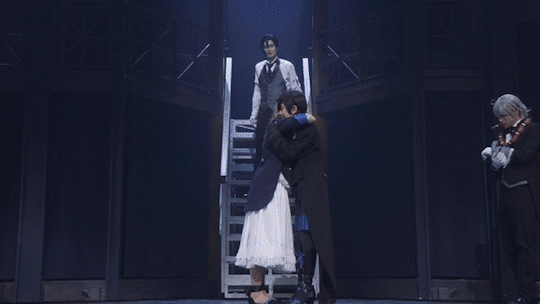
Sebastian’s Aftermath
The reunion is but a simple addition, but it allows the musical to show the impact of such a traumatic event on the omnipotent demon butler.
The Cinematic Record showed how cocky Sebastyun was, and how he didn’t have a single worry in his life. After Undertaker had fatally wounded even the demon however, Sebas became a different person. In the finale we see Undertaker silently disappearing into the shadows. Sebastyun wasn’t even entirely sure whether Undertaker was there, but at the merest suspicion already you see him flinch and twitch. This shows how from now on Sebas has become a person who is on edge.
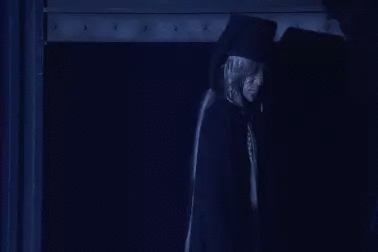
I mean, what’s the point of telling an event if the event doesn’t impact the story and characters, right? In this way too, the inserted aftermath scene skillfully wraps up an overwhelmingly eventful story.
9. Afterword
Well, thank you for reading this looong post till the end! As discussed in this post, TotC did a wonderful job at adapting an existing story with consideration of its audience and medium.
The largest obstacle of the theatre medium is time constraint, so the makers have to sacrifice parts. In what was sacrificed however, they more than sufficiently compensated by including parts outside the Campania Arc into the musical, without harming the integrity. This shows just how much respect and knowledge the TotC team have of the source material.
As a musical adaptation, it is an exemplary production.

Related posts:
Hyper Detailed Development - The Art of Kneeling
That Demon, Skin Crawling
That Butler - Punchable
Lost in Translation II - Sebastyun’s Butlernese
#Kuromyu#Comparative analysis#Tango on the Campania#Campania#Musical#Sebastyun#Furukawa Yuta#Uchikawa Reo
131 notes
·
View notes
Text
Thoughts on Endings and Ethical Creativity
I’ve been thinking a lot about how most of the best stories I’ve watched or read have had a bittersweet ending. I think this is because it is the most likely scenario any of us will repeatedly encounter in life as we end relationships, change careers, move away, bury loved ones, etc. It’s a place where contentment, happiness, and grief can coexist. By extension, it becomes the ending that feels truest.
Whether you personally prefer an ending that might “feel truest” or not isn’t really what I’m on about here. I’m thinking in terms of writing and what resonates widely, while also being creatively responsible.
A happy ending, while nice on occasion and appropriate for some lighthearted genres, often rings false and patronizing if it’s not earned. It doesn’t help that there’s always the chance something will go wrong in our happy characters’ futures that makes it hard not to squint. (Sure, the lovers kiss at the end, but do they survive, I don’t know, parenthood or 2020, or, dear Lord, parenthood in 2020, if they’ve experienced no real hardship?) Sad endings can ring false for a similar reason. Barring death of the primary POV character, there’s always a chance things will turn around, so why end on a depressing note? (Our beloved protagonist is destitute and alone by the story’s ending, but he’s only forty. What are the odds he stays downtrodden indefinitely? Isn’t the story of how he might not rather interesting?)
Overly happy or sad endings that haven’t earned their place through foreshadowing and tone often come out seeming too fanciful/childish, intentionally depressing, or downright incomplete. In my mind, this usually means an ending that shows striving is what will resonate most. Striving for or toward what, exactly, depends on the story. Unless you’re dealing with a character who truly has no reason to work toward or hope for more (e.g., they don’t die, but they have every reason to believe endless misery and/or death is coming soon), ending on a completely sour note seems strange.
And if by the end of a story, a writer finds the only way to impart meaning upon the narrative is to kill off a beloved character unexpectedly, I question the integrity of the story. Death is inevitable and only sometimes predictable, but that’s not a story we need told to us; life teaches us that lesson. The stories we love to tell ourselves tend not to reflect reality, either; they make sense of reality’s chaos, including its unfair death. Often, stories are here to show us death can be faced or even cheated, or that our inability to face its inevitability will be our downfall. Loss is not the interesting part of the story; it is not what imparts meaning. It is how loss is (or is not) faced that makes the story.
Maybe that’s why bittersweet endings work so well. When are we not losing something, even as we are gaining anything else?
On Last-Minute Character Deaths
Related to the above is the question of whether writers owe audiences closure, and I think they do. I’m not one to “cancel” or censor really much of anything, even socially, but as our understanding of mental health and well-being grows, I’ve begun to question the ethics of last-minute tragedies in larger works. It strikes me as privileged and perhaps able-bodied/minded to assume you can knife your audience and their wound will heal without your care to aid them.
As numerous shows have killed off beloved lead characters in or near their series finales in the past few years, I’ve been troubled to think about how many struggling viewers have had to face them, especially this year. We’re surviving tyrants, a pandemic, record unemployment, spikes in domestic abuse, spikes in suicide. It is a dark time.
Does that mean coddling or treacly happiness is what the doctor ordered? No, treacly happiness, unearned, is nearly as frustrating as unearned tragedy, though less likely to cause psychological damage. But I do think it means writers have a duty to tread carefully. Stories matter, and the audience who hears, watches, or reads them matters. By all means, kill a main character, but lay the groundwork for that death and let your audience process the grief with the characters who remain. If this is a main character who’s been around for multiple books or dozens of episodes, realize the grief won’t be processed in a few pages or a single episode.
You can do anything creatively. You can explore any and all dark subject matter. But I think if you close with unexpected pain, you’re not here to write a tragedy, you’re here to be a sadist to people who did not consent to being masochists. Do this to enough people, and you will find your masochists in the crowd, but that doesn’t mean their acceptance of your sadism is more valid than the outcry of those who would never have consented had they been informed.
Endings matter. They’re not to be tacked on as an afterthought or to be used to make a petty point (unless that was the point). Endings are what stay with audiences on their own life journeys. This is a meaningful and potentially powerful connection between creator and audience member that deserves honor and respect.
#writing#me irl#there are examples of GOOD endings that end on character death#six feet under#breaking bad#nurse jackie#to name but a few#those were entirely earned and foreshadowed#they were not sucker punches#surely i don't have to name all the shows throwing sucker punches#they're notorious by now#it's unsurprising that it's mainly straight white men with creative power who think sudden death without room to grieve is somehow deep#no my dudes#you're just emotionally stunted#because once upon a time someone taught you that processing emotions was weak#and no i never watched spn#but i do get tired of seeing stories destroyed#which is why i mostly only watch finished series#lucifer got me tho
372 notes
·
View notes
Text
Since its 3Hs anniversary some really cool things I like about the game that aren’t talked about enough because the fandom is too busy arguing who is right and who is wrong
The worldbuilding just. 3H has honestly one of my favorite fictional settings. Its just both expansive but also genuinely interesting. I have spent HOURS thinking about the world and made so many ocs its not even funny. I love thinking about the setting of the game so much.
I LOVE the puzzle like way the game explains its world and story. Like I know some people don’t like it because it makes the game a bit too convoluted but personally? I LOVE 3Hs way of not telling everything but rather giving hints and clues the player has to piece themselves. It makes the games world feel more interactive and feels so satisfying. Then again I enjoy that kind of approach to worldbuilding
In general I love 3hs fragmented story and the way how the story is placed in many different fragments. It is geniunely rewarding to replay the game from another storypath and notice the foreshadowing Would’ve the story been probably better had it been just one storypath? Honestly yes. But 3h is ambitious and one of the ways it is is with its fragmented story structure.
The structure of White Clouds is criminally underrated honestly and gets way more hate than it deserves. I love how the first few chapters set up the world of Fodlan and show injustices/conflicts of the world with chapters like the chapter where you face off Lonato for instance. Then the next few chapters are spend in deepening the mysteries such as the conspiracy against the church and the mystery regarding TWSITD. Then Jeralt dies and the last few chapters are spent as “beginning of the End” so to speak, as things clears to the intense climax.
On related note I LOVE how the game handles perspective and how the lords are the respective ways we view the story. I know so many people say “WHite Clouds is same on all paths” but I do feel that’s kinda the point. The story is the same but there are differences that come from the way each of the lords is strongly characterized and has different values, worldviews. The subtle changes on what are focused on in each route also foreshadow what will be focused on each route, which I think is super cool.
Even beyond the lords and routes the game does explore the idea of perspective well. I do think 3h has this very “everyone is the hero of their own story” type of approach to perspective and it shows it well. Each character believes they’re in the right and you can get this view that they view themselves as right. Even Agarthans who are the designated villains have this sense they think they’re in right and that the Nabateans were evil.
The way how games routes being divided into having a different focus is very cool. I love how AM is a smaller scale personal tragedy, how CF is a battle of ideals and how VW explores the world and reveals deeper mysteries. I also love how all of these are related to the lords ideals and worldviews: Dimitri is the most conflicted of the lords so he gets the most characterfocused story focused on . Edelgard is the most ideologically driven so her path focuses on her ideals and battle of wills against Rhea. Claude is the one who is the most freespirited and wants to know the truth so his route focuses on revealing the mysteries.
Also the way the houses characters reflect their respective routes storyline and central themes: Black Eagles are nobles that have conflicting relationships with nobility reflecting Edelgards goal, Blue Lions are all united with the trauma of Tragedy of Duscur, and Golden Deer are a house of misfits who give this “ragtag group who will save the universe with POWER OF FRIENDSHIP and this cool gun I found” vibes which fit the route PERFECTLY
I LOVE how the game plays with and subverts a lot of Fire Emblem tropes. While it does play some tropes straight (dad death and evil cult manipulating behind the scenes) it does do a lot to break from series conventions and playing with ideas to make a more ambitious story. The way it either subverts expectations (The evil emperor being female well intended extremist, Rhea being the Gharnef/Medeus instead of the Nyna archetype she’s presented as), twists familiar tropes to their natural extreme (Dimitris arc is basically the natural extreme end of stereotypical FE lord) and other similar things make the game feeling so planned out, like the writers understood FE stories and wanted to make something that challenges FE while still feeling like it.
The way how every major player acts as foil/pararell to another player is so GOOD. Every faction leader can be compared to the other somehow and that just makes the game SOOOO fun to analyze, trying to find all the similarities and differences and pararells is so rewarding.
A more specific example on this is how i love how the game plays with the idea of holy/sacred weapons. While normally these weapons are artifacts from goddess that defeat dragons, here the holy weapons are bones made from dragons and just???? HOW METAL IS THAT????????? It’s just such a neat way to subvert the idea of sacred weapons. Rather than being blessed creations of the goddess, they are weapons of destruction made by the villains.
I ADORE THE GAMES science fiction elements. I know people say they feel out of place but personally, they make the game memorable for me. I still remember the first time I saw that scene with nukes. I especially love the heavy implication that Sothis isn’t a goddess but rather a powerful alien. It makes her character much more interesting
I know a lot of people don’t like Agarthans but can I just say their backstory being “forced to hide after their land got conquered and desiring it back” making them a dark mirror not just 3h lords/Rhea but FE lords as whole is SO FUCKING METAL. This is what I mean with 3H writers knowing their tropes like back of their hand.
I love how in Part 1 sometimes you’d talk to two characters in Monastery at once instead of just one. It’s something I miss in part 2 honestly.
I love the small sidequests such as the fishing tourney and White Heron cup and wish Part 1 had more of them, it would’ve made the school part feel more alive.
I LOVE how some missions (esp paralogues) have subgoals that you can clear to get better rewards. I wish the game had been more clear with them or even made them main goals of maps sometimes.
I LOVE THE WAY Paralogues act as small gaiden stories that show more of the games world and characters. Its a neat way to let the sidecharacters shine and reveal some neat secrets of the games world and story.
The gameplay loop is honetly fun and satisfying. It is rewarding and while it gets tiring towards the end overall its a good gameplay loop.
I ADORE the aesthetic of Shambhala. Its just so sleek and sinister. The cyrillic letters spelling different words is so cool. Shambhala is my favorite map in the game and the aesthetic is a big reason why.
The games soundtrack is so good!!!!!!!!!! But not only that I LOVE the way its electro elements subtly hint of Agarthans being in control behind the scenes. This is especially cool in Road to Dominion where the electro parts are barely noticeable yet present. but other tracks have subtle electro vibes as well. The other way the games music tells the story (such as use of leitmotifs or how the monastery music changes once Jeralt dies) is great as well.
I love how 3h can be read as an allegory for reformation era and reneissance. Its such an interesting way to read the games events and compare it to a real historical periods there’s quite a bit of f
In general I ADORE the cultural references of the game. There’s surprisingly lot of way the games world is based on real life and the details are just *chefs kiss*
THE GAME IS DENSE WITH THEMATIC IDEAS. Besides the perspective the game tackles ideas of how trauma can affect a persons psyche and worldview (as well how a persons trauma affects the way they interact with the world which in turn can affect the world as well), grief, societal values, historical revisiniosm and so much more. The game tackles SO MANY topics in an interesting manner, it is thematically just as dense as it is storywise as well.
I also love how the games thematic parts work in harmony with the story rather than one overshadowing with the other. Its super refreshing honestly where a games themes and story are both rich and I don’t have to pick one over the other.
Lastly I ADORE the games central message (or at least what I see as the central message anyway): The world’s fucked up and most people want to fix it, but what they deem fixing differs and because of that they go into conflict or outright war rather than trying to find a common ground. Everyone wants a better world but no one can agree what a better world truly means so they fight over it. It was a theme that not only resonates with my personal values but also hit me REALLY hard when I first played it as it’s a theme that I found incredibly relevant and reflective of our own world during the time I played the game for the first time.
So yeah. I made this post since there’s SO MUCH neat things about the game, its gameplay and story that sadly get swept under the rug in favor of either arguing which lord was right/wrong or complaining how the game is an unfinished, rushed and overambitious mess. Is 3h perfect? Hell no. But it’s a game that I hold near and dear to my heart and does genuinely SO MANY THINGS RIGHT, I’m sad no one talks about the genuine strengths the game has anymore, instead just complaining.
I’m not even joking when I say that 3h should be up there as heralded as one of the best, most ambitious and complex JRPGs alongside Xenogears, the first Xenoblade game, Suikoden and Trails series as whole along other such games. Its a shame the games reputation is less like those games and more like Persona 5s where everyone focuses more on its flaws and the fans being annoying than the fact the game does geniunely A LOT right. It’s just that good, ambitious game I love so much.
35 notes
·
View notes
Text
In the waiting of YuuMori ch.61 translation, I was thinking that I'm under the impression that the climax of the arc was a bit... rushed? I don't know how to explain it well, but considering the previous chapter, I thought that something more epic or better would have happened. I guess that the point of this arc is related to the ACD canon in the meaning of taking back Sherlock Holmes after Reichenbach Falls, but ends up, in YuuMori canon, in being a sort of closure for all the characters.
Was it needed? Probably not. The Final Problem was fine with its closure, in a certain way, but since the story went on (and it was planned since Billy the Kid character had already been foreshadowed) here we are. To be honest, I was expecting something more... I felt like the way the handling of the situation was announced didn't match with the way it was handled in the end. I expected more than Sherlock being kind of a diversion for shifting Moran's attention during the clue moment, giving Louis the chance to talk to him (yes, I know he stopped Moran and gave him William's card, but it ended up subclassing Louis, in a certain sense... and I think that this arc should have meant for Louis the fact that he truly could be able to succeed).
Also, not secondary, Sherlock triumphally shocked everybody who thought he was dead. What are the implications of his decision now? And if Liam comes back as the final panel suggests... doesn't it make the whole FP resolution crumbling? One walks under the sunlight, the other is in the shadows... And if the former Lord of Crime is back, I don't think people will be this happy (sounds like Lelouch in that horrible rubbish that was Re;surrection)... But, as I said before, I think that this arc is kind of closure.
So probably, next time, while William went to talk with Albert, Sherlock would probably go meeting John (at least to reassure him that he's fine) and in the end, might probably pick William up and go back to America (or wherever). Also, the two of them's path has been part for a while now, according to Sherlock, so for the two of them to meet again is important.
Yet, the way these chapters are succeeding is not my liking, actually, because I can't really find a logical sense in certain scenes and choices. Why the hell was all that Adlock teasing in chapter 60 when all that Irene/Bond did in 61 was *proudlyheartlooking Sherly*... standing there in her fancy dress and doing nothing in particular? I know I'm biased, but I don't understand the point of that beautiful and glorious scene if there isn't any sequel... Fanservice aside, obviously. I'm also impressed that the people in the venue focused their attention only on Sherlock (I know... he's hot, how can I blame) and nobody seems to care that Irene Adler was at his side... I don't know you, but if I had been them, I would have questioned the reason why two people who were supposed to be dead were in flesh and blood among them... didn't they deserve closure too? Was that only moment shared together in ch.60 their closure? I refuse to think that the teasing was all we could get... and I still hope that they have the chance to talk as well (after all, the magic of Cinderella lasts for one night and I don't think it's over yet) *stillbeinghopeful*. So, in the end, I believe that the point of this whole arc (which I think could be the last for real) is coming full circle and forgiveness too... Moran's closure was heartful, but now it's Albert's time and, considering how things went... now I'm more prone to thinking he will earn a happy end too (or not, we'll see). If else, Albert dear, I'm in the place where good wines are made, here arsons have been frequent recently (ç_ç) and I have a place at home: you're welcome! :3
15 notes
·
View notes
Note
Hii, responding to your post, I hope you’re doing well!
————
I tend to interpret most “spn is a terrible show” posts from spn fans as just joking around, unless they’re going into actual analysis of it, but I don’t see everything you see in your corner of the internet, and I also am not all that great at interpreting stuff (insults directed at me go over my head sometimes 😂 )
I agree, I love Mary being brought back! I really loved the fact that they turned her from a generic tragic figure into an actual character with nuance, and made the boys confront seeing their mother as an actual person.
I tend to describe Supernatural as simultaneously awful and freaking amazing, and overall an enjoyable and unparalleled experience.
My main criticism of the show is how it starts building a theme, an idea, having some foreshadowing, and then not following through with it, and possibly even contradicting the theme later.
However, Supernatural is such a freaking cool show with so much to analyze and oh dear lords LAYERS of subtext!
And Dean Winchester is probably one of the most complex and nuanced characters I have ever seen—
But the thing is, the show doesn’t dive into the subtext all that much. It doesn’t follow through on stuff that should probably have been explored deeper.
On the other hand, that fact, plus the existence of Chuck and the Ghostfacers Effect, makes Supernatural the PERFECT sandbox for creators and literary analysists!
Hmm… I’m wondering- maybe that’s why we have such a vocal and active fandom that actually makes things happen; the construction of the show means that the majority of people who enjoy it are the ones that can think on more than just the surface level, and enjoy putting the effort into understanding the subtext. That means that the show attracts passionate people who think critically about things. And that passion, that is what makes us able to achieve things on such a big scale.
I guess what I’m saying is, on the surface, Supernatural is a mediocre show. Dive down a level and it becomes amazing. Another level, and you spot all the stuff that makes it awful. Dive down even further and you can suddenly see how utterly brilliant Supernatural is. Then, dive further still into the meta, and notice how- heck I don’t even know what to call it, outside forces influencing the plot in ways that mirror real life (like how the writers strike, something out of authorial control, caused a domino effect that led to Destiel coming into being despite efforts to suppress it, mirroring how Cas was outside of Chuck’s control, aka outside of the control of the writers’ self-insert)… yeah there’s a reason we all have brainworms 😂 and it’s so amazing and profound, and honestly it’s a perfect example of the phenomenon of characters coming to life and the story going where it wants regardless of the author’s plans. Happens with me all the time on little levels, but Supernatural… yeah. It’s awesome.
Heck, my reply was a lot longer than I meant it to be, I apologize for that! This is supposed to be a “cheering you up by reminding that you’re not alone” post, and it did end up a bit of a ramble. Anyways, in short, Supernatural is overall a good show in my opinion, you’re not the only one that thinks that.
Hope you have a wonderful day/night, and whenever you next sleep, sleep very well 😊💜🌸
all of this is very accurate :)
honestly I've been having a bad week so my salty little post was probs a result of that too, but I like all of your points and you are very right :) and I agree without its flaws the show wouldn't have spawned such a flux of creativity and passion and drive here, and that is truly the best part of it!
9 notes
·
View notes